
www.braintumourresearch.org Tel: 01908 867200 | info@braintumourresearch.org The news magazine for brain tumour activists Issue 010 – Autumn 2017
Lindon: Father, brain tumour warrior & fundraising hero Your Wear a Hat Day Stories Save the date for 2018! & Drug repurposing – a novel approach for the treatment of brain tumours + MPs pledge support COVER STORY
Ben



After October 15th 2017, the old round £1 coin will no longer be legal tender. We are working with our recycling partners, Recycling for Good Causes to put them to good use and generate much needed funds.
Simply contact Recycling for Good Causes and they will send you a specialised Round Pound Appeal collection envelope for Brain Tumour Research that can be returned to them free of charge.
Call: 0800 633 5323 (Freephone)
Email: info@recyclingforgoodcauses.org
Visit: www.recyclingforgoodcauses.org/appeals-2


Round Pound Appeal 2017
GIVE OLD MONEY NEW LIFE
4 Rewriting the future of brain tumour research
An update from our Chief Executive
6 Latest news from our family of Fundraising Groups
8 Ben Lindon: Father, brain tumour warrior and fundraising hero
10 Your Wear A Hat Day stories
Save the date for 2018!
12 Fighting Force Heroes and their incredible fundraising achievements
16 Challenge Event Calendar 2017/18


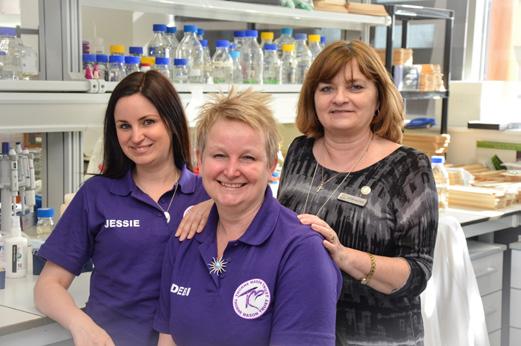
24 How to leave a gift of hope in your Will
26 Campaigning MPs pledge support

18 Research updates
British Neuro-Oncology Society Annual Conference 2017
Drug repurposing – a novel approach for the treatment of brain tumours
22 Focus on a cure – the development of Brain Tumour Research Centres of Excellence


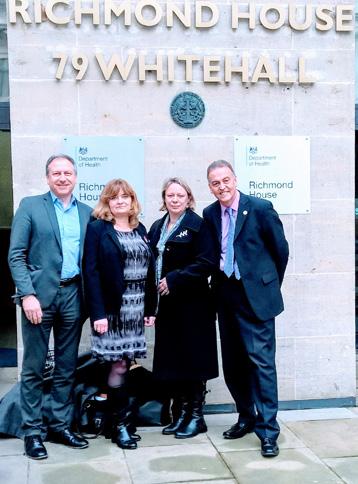

26
How you can influence Parliament
30 Meet our new trustees
32 News and updates from our Member Charities
34 The Hope Tree Christmas Appeal Remembering loved ones this Christmas

35 In Our Hearts


Written and edited by: Natasha Pile, Crispin Zeeman, Natalie Binder & Sue Farrington Smith at Brain Tumour Research, Suite 3, Shenley Pavilions, Chalkdell Drive, Shenley Wood, Milton Keynes MK5 6LB. Printed by: BCQ, 1 Osier Way, Swan Business Park, Buckingham, Buckinghamshire MK18 1TB www.bcqgroup.com Designed by: Clearthinking Creative, 51 Church Street, Hungerford, West Berkshire RG17 0JH www.clearthinkingcreative.co.uk
Contents
www.braintumourresearch.org Autumn 2017 3 Cover story 8 Ben Lindon: Father, brain tumour warrior and fundraising hero COVER HIGHLIGHTS 10 Your Wear A Hat Day stories – save the date for 2018!
Drug repurposing – a novel approach for the treatment of brain tumours
20
MPs pledge support
When Brain Tumour Research
was launched in 2009, together with our Member Charities we set out to raise awareness of brain tumours and in particular the woeful underfunding for research.
We identified that up until that point, less than 1% of national cancer research spend was being spent on brain tumours despite the disease killing more children and adults under the age of 40 than any other cancer.
Our role models were the breast and leukaemia charities who had huge public awareness and as a result were able to galvanise the general public and large organisations to support their cause.
At that time as a sector they were raising £45m (84 charities) and £48m (97 charities) respectively. In 2009 there were just 31 brain tumour charities raising £3m between them.
Together with other larger cancer charities and Government funders who were partners of the National Cancer Research Institute (NCRI), the national annual research spend on breast cancer and leukaemia at that time was £45m and £30m respectively, whilst for brain tumours the investment was just £4m.
For both of these cancers there have been significant advances in treatments as a result. Today five-year survival is 87% for breast cancer and 52% for leukaemia, compared to just 19% for brain tumour patients.
We recognised that in the 20 years prior to our launch and despite the emergence of brain tumour charities, progress had been slow and we needed to work together to change this, so we came together and launched BrainTumour Research, with representatives of Member Charities as trustees.
To achieve significant progress we identified that increased investment in research needed to come from three areas:
• The Government
• The larger cancer charities
• Brain tumour charities supported by donations from the brain tumour community, the wider general public and organisations
We are delighted that progress is being made on all fronts!
The Task and Finish Group established by the Department of Health has now completed its meetings and we eagerly await the report’s publication, scheduled for Autumn 2017. This Working Group was established as a direct result of your support for the e-petition launched by Maria Lester, who lost her brother Stephen Realf to a brain tumour. Over 120,000 of you signed this petition which led to the Parliamentary debate on research funding for brain tumours. Your support also galvanised an unprecedented 70+ MPs to attend this debate, which led to the establishment of the group.
I have been proud to represent you all alongside Peter Realf, Maria’s father, as the Group discussed the opportunities for research into brain tumours, barriers which currently exist to achieving these and the areas that deserve particular focus. Momentum is gathering with members of the Working Group already announcing new initiatives to improve outcomes

for brain tumour patients and their families, including Cancer ResearchUK’s recent announcement that they will be funding £25m over the next five years, including adopting a brain tumour research Centre of Excellence model.
Our own growth has been phenomenal and that is thanks to you our loyal supporters who have helped us raise awareness by sharing your stories, signing e-petitions, lobbying your MPs and fundraising to support our vital work. Whether you have organised a coffee morning, Do Lunch or Wear A Hat Day event, whether you have climbed mountains, jumped out of a plane, ran, cycled, walked and swam miles, displayed your collection boxes, bought Christmas Cards and merchandise or simply donated – you are making a difference and we won’t be able to find a cure without you.
In just eight years from a standing start of £zero, in 2009, our income has grown organically to nearly £4m a year. With your help, we intend to more than double that over the next three years!
What’s more, our plan to raise awareness and grow the market for brain tumour fundraising is also gathering momentum. Our Member Charities income has grown from £1m (nine charities) to over £3m (20 charities) in the same timeframe. Indeed, the overall brain tumour charity sector has grown from £3m (31 charities) to £20m+ (over 80 charities).

4 Autumn 2017 www.braintumourresearch.org
Research spend

Our investment in growth, campaigning and raising awareness is paying off. With your help, and the help of our Member Charities, we have been able to establish and sustainably fund four thriving and productive Centres of Excellence. Each of these Centres are able to attract more funding as a result of our support and over the next two years we will see their research being translated into clinical trials, taking us closer to finding a cure.
In 2017, we have already granted £2m which brings our total spend on research to over £7m in just 8 years and in that same timeframe our Member Charities have contributed a further £3m. Our dedication to research funding means that we can allocate a greater proportion of funds to brain tumour research than any other national charity.

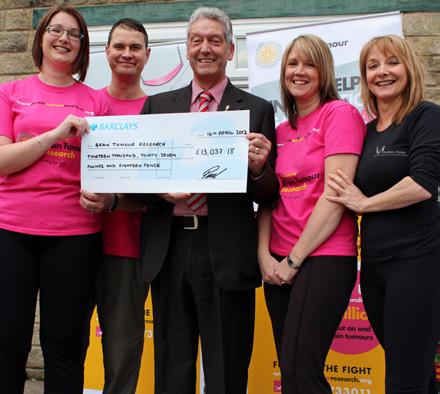
We are also proud to be funding the only brain tumour tissue network in the UK. With 26 Neuropathology Centres involved, this gives effective coverage to 90% of samples available in the UK. Researchers can access this to help answer their research questions. This initiative was thanks to the instigation and planning of our Member Charity brainstrustas well as Charlie’s Challengewho helped us co-fund it in the early years. We are now working with the Southampton-based BrainUKto further develop this facility.
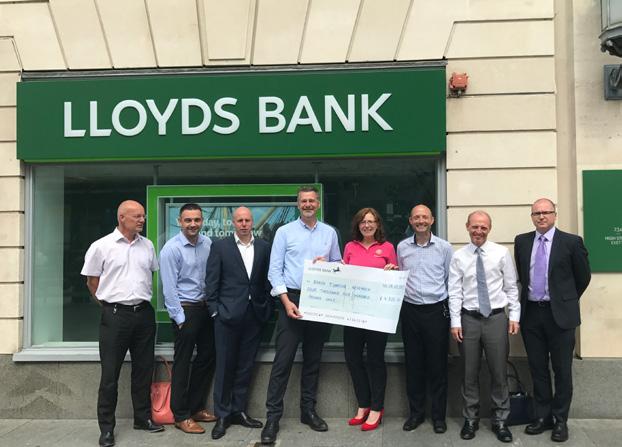

Please help us reach our funding goal of £7m per annum to support seven Centres. Please keep on reaching out to your friends, family, colleagues and the organisations around you to also get involved.
TOGETHER we will find a cure.
Sue Farrington Smith MBE Chief Executive


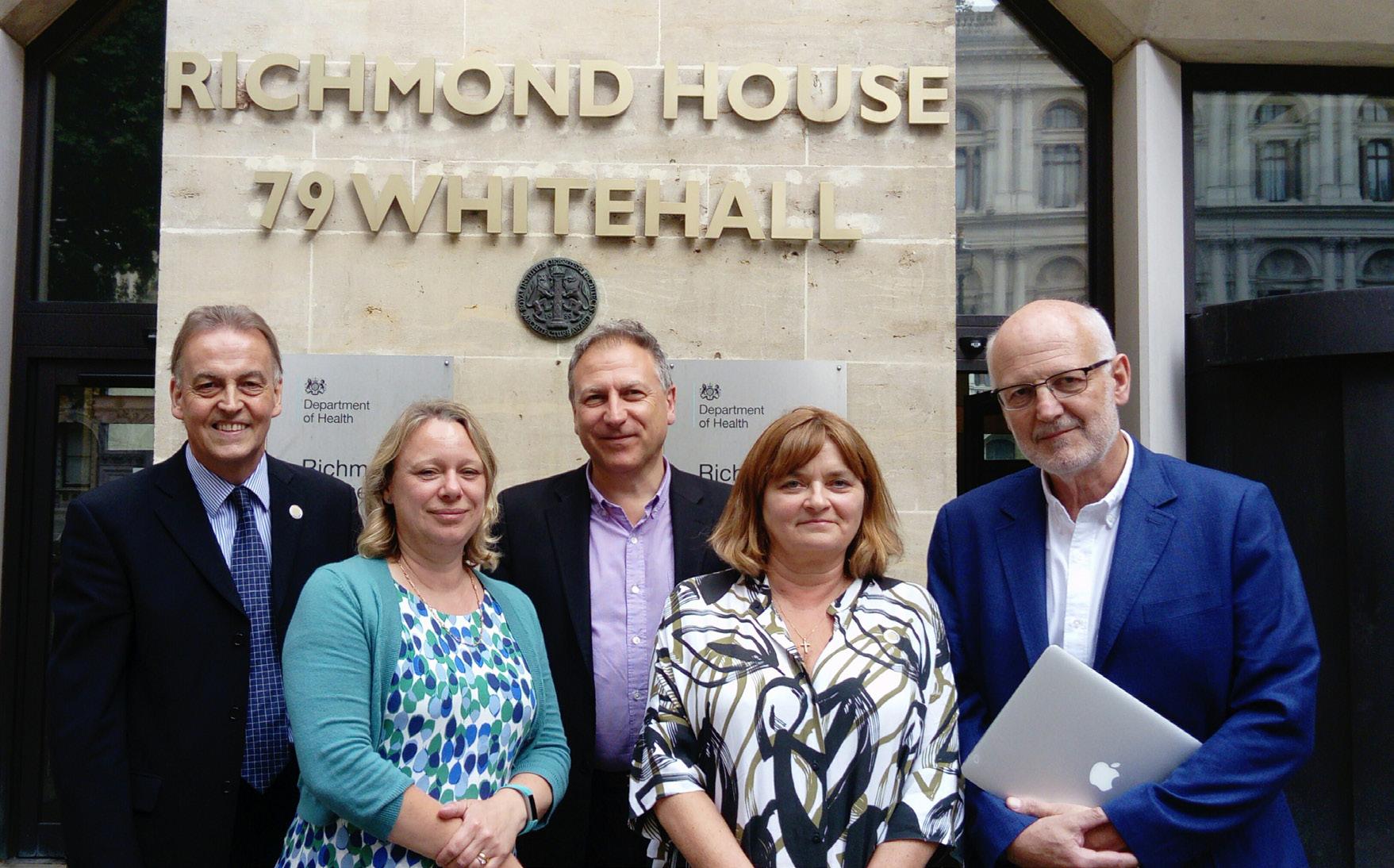
www.braintumourresearch.org Autumn 2017 5 £4,000k £3,000k £2,000k £1,000k 0 2008-092009-102010-112011-122012-132013-142014-152015-162016-17
Income £900k £450k 0 2010-112011-122012-132013-142014-152015-162016-172017-18
Registry Imperial College QMUL Plymouth Portsmouth
Tissue
£1,800k £1,350k
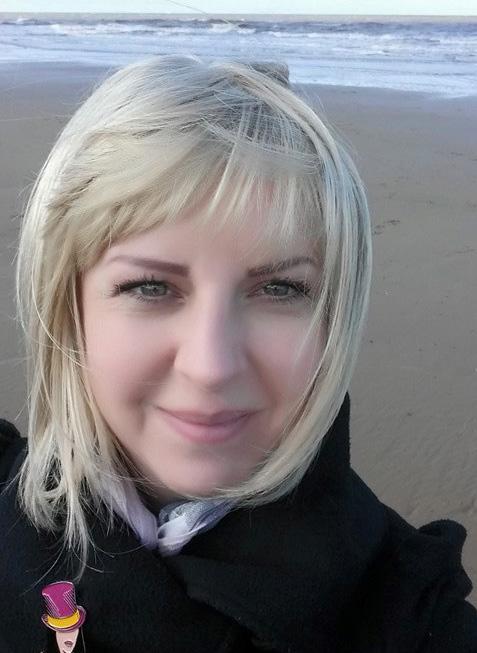
Cat Anderson - In loving memory
It is with much sadness that we share the heart-breaking news that Cat Anderson passed away on 14th June 2017. Cat was just 38 years old and had been battling a brain tumour since August 2014. Fundraising Group, Cat In A Hat, was established by her father Rab Anderson to help raise much-needed funds and awareness for this horrible disease. The group’s name was inspired by the extensive collection of hats Cat
wore during her treatment. Rab said: “Catlived forherfamilyandfriendsandbelievedinthe powerofpositivity–whichIamsurehelpedher toliveaslongasshedid.LastAugust,Cattook onaskydivedespiteherterriblefearofheights andsaid:‘WhathaveIgottobeafraidof?I’ve onlymylifetolose.’Ourlovely,funnydaughter livedherlifetothefull,leavinguswithsomany preciousmemories.”
Over the past three years, Cat In A Hat has not only raised thousands for vital research but also incredible awareness for brain tumours as an often overlooked and underfunded type of cancer.
Our love and thoughts are with Cat’s many family and friends.


A warm welcome to FluffyCloudandCo.
– the latest addition to our family of Fundraising Groups. FluffyCloudandCo was established by Jane Barltrop with her daughters Alice and Emma, in memory of their beloved husband and dad, Pete.
Pete was undergoing treatment for a brain tumour when he passed away from hypertensive heart disease at just 60 years old, in 2016. Since the moment of his diagnosis, almost two years before, his family knew that they wanted to raise both funds and awareness to help combat brain tumours.
The group’s name was inspired by Pete and his daughters’ love of a cosy bed, which bought special comfort to all whilst Pete was undergoing treatment that left him bedridden for large portions of the day. Emma remembered: “Whenyouarefacedwithadifficulttimein yourlifeitisthesmallthingsthatcreepupon you,likeneedingmorerest,thatcanfeelso muchheavier,theworldthatmuchdarkerand yourworrythatmuchlessresolved.However inthesemomentsinsteadofworrying,dad gaveussmiles,makingthesetripstobedjust asnormalandashappyasthelifetimeof memorieswehaveofgoingtobed,wakingup, openingpresentsandcelebratingbirthdaysand IwillalwaysfeelclosesttohimwhenIaminmy FluffyCloud.”
www.braintumourresearch.org
FluffyCloudandCo. has already taken part in our national campaigns On Yer Bike and Wear A Hat Day and Jane has even raised money by selling plants from her front garden. In addition, Alice and Emma have been busy selling lovely homemade crafts. With these amazing efforts, the group has already raised thousands for BrainTumourResearch
OUR NEWEST GROUP

Search: ‘FluffyCloudandCo. on Facebook and ‘like’ their page to stay up-to-date with their latest fundraising plans.
FUNDRAISING
GROUPS
6 Autumn 2017
Fundraising Group updates song for sue
TheSongforSue Foundationhas been hard at work since it was established in early 2017, in memory of Sue Thomas, who passed away from a glioblastoma mutliforme in 2015 at the age of 57. At the time of writing, the group has raised over £18,000 – that’s almost one week of research funded at one of our Centres of Excellence. In June this year, the group visited our dedicated research centre at Imperial College, London, to place six tiles on the Wall of Hope; representing the six days of research they’ve funded so far. Before putting up their tiles, the family were given
a tour of the research laboratories by lead scientist Dr Nelofer Syed and visited the neuro-surgery unit, hearing from leading neuro-surgeon at Charing Cross Hospital, Mr Kevin O’Neil.
Sue’s daughter Holly said: “Whenyoulookatthe WallofHopeandseeeachpersonwhohaslost theirbattlewithabraintumourorisstillfighting, it’sgoodtoknowthatsomethingpositiveis comingoutofatragicstory.Iamveryproudof ourachievementstodateinmemoryofmum.We areaimingtohit£50,000raisedbySongforSue bytheendof2018.”
Sue’s husband David and their daughters, Rachael and Holly along with son-in-law,



Together we will find a cure

In a touching tribute to a much-missed friend and colleague, Clarion Housing Group has chosen TheDarel BryanFoundationas its Charity of the Year, with exciting plans for the year ahead.
Darel Bryan passed away in February 2016 after a 15-month battle with a glioblastoma multiforme (GBM). He was just 33 years old and left behind a loving family and his beloved partner of 12 years, Natalie.
Darel joined the Maple House office of Affinity Sutton housing association in Bromley, now part of Clarion Housing Group, as a Housing Officer in March 2008 and continued as an employee until his diagnosis in December 2015. His mother, Sara Bryan, is a Customer Service Advisor for Clarion Housing, also at Maple House.
Lewis have organised a variety of fundraising events, including a very successful dinner dance at Surrey Downs Golf Club last year which raised over £12,000. Sue’s sister Gill raised an additional £3,165 through a sponsored walk, which is set to become an annual event.


Thank you to all at TheSong forSueFoundation, we are extremely grateful for your support.
Clarion Housing Group invited staff to nominate a charity to become its Charity of the Year. Sara Bryan explained: “Threecharitieswereshortlisted.Iwasso touchedwhenTheDarelBryanFoundationwonwith 65%ofthevote,reflectingtherespectandaffection Darel’scolleagueshadforhim.”
Sandra Sanglin, head of corporate social responsibility at Clarion Housing Group, said: “Eachofficewithin thegroupwillbeorganisingfundraisingeventsto raisemoneyforTheDarelBryanFoundation,with ideastodateincludingbakesales,tuckshops,quizzes anddress-downFridays.Already,inMarchthisyear, Darel’sworkcolleaguesattheMapleHouseoffice haveorganisedablacktieballattheSelsdonPark HotelinSouthCroydon,whichraisedanawesome £7,500.Anotherballisplannedfornextyear. Afootballtournamentwhichraised£950isduetobe repeatedlaterthisyear.ClarionHousingwillmatchall fundsraised.Atotalcloseto£50,000wasraisedfor WellChild,ourpreviousCharityoftheYear.”
We are delighted that Clarion Housing Group are honouring their memory of Darel in this way and are hugely grateful for their plans to fundraise and raise awareness.
www.braintumourresearch.org Autumn 2017 7
IN PARTNERSHIP WITH BRAIN TUMOUR RESEARCH FOUNDATION THE
a donation here: www.justgiving.com/fundraising/songforsue Search: ‘TheDarelBryanFoundation’ on Facebook and ‘like’ their page to stay up-to-date with their latest fundraising plans.
Make
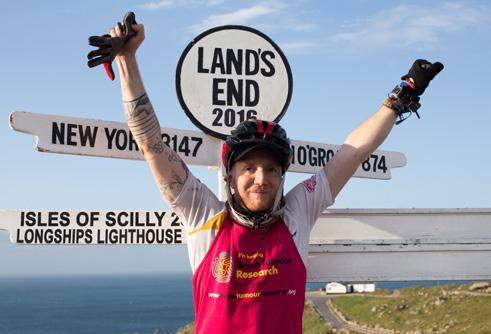




BEN LINDON:
FATHER, BRAIN TUMOUR WARRIOR AND FUNDRAISING HERO
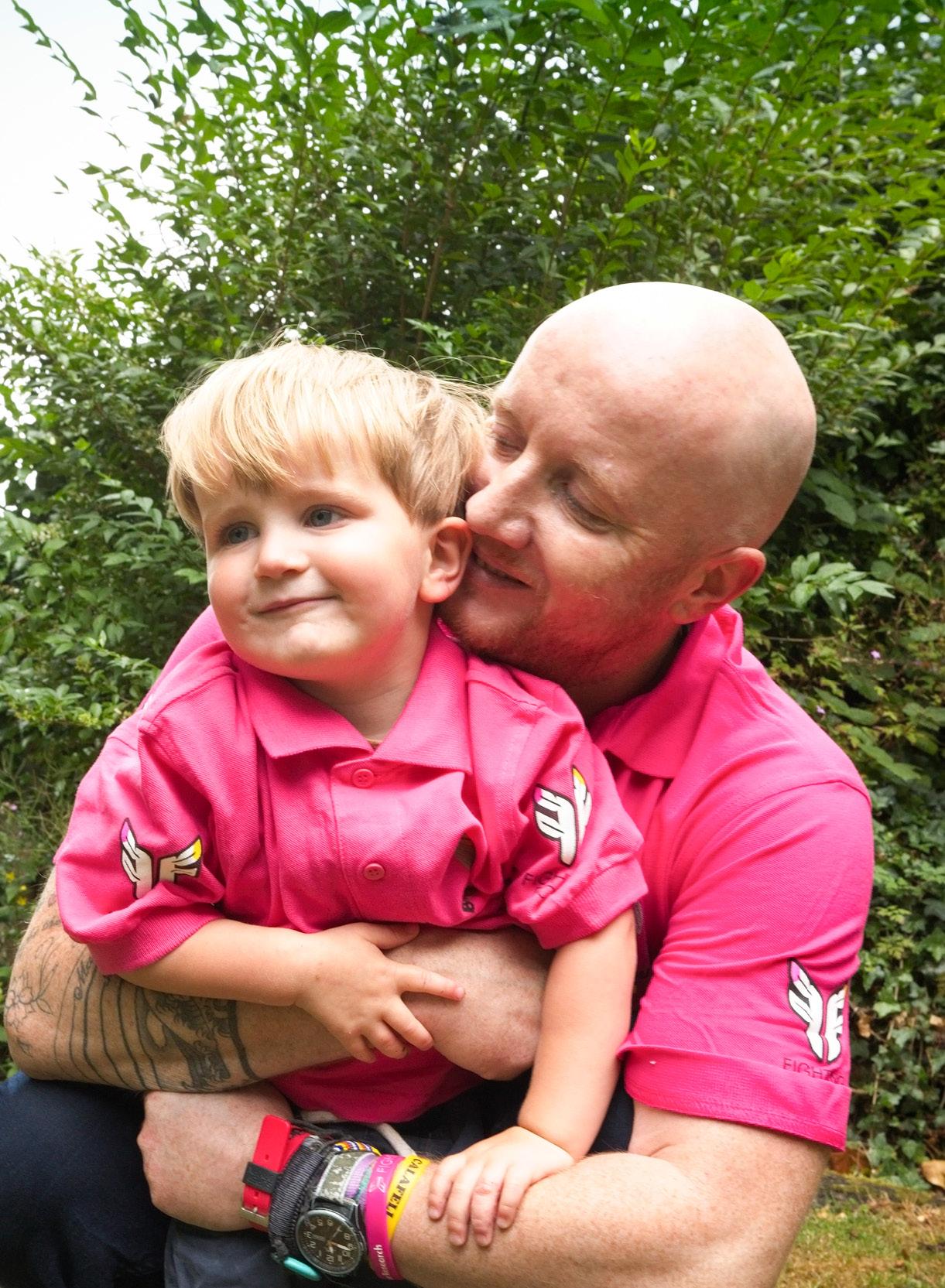
8 Autumn 2017 www.braintumourresearch.org COVERSTORY

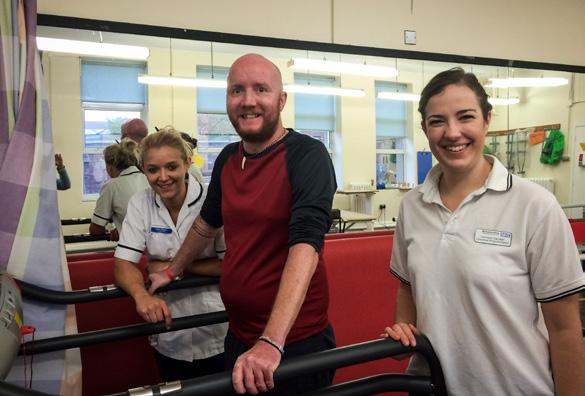



Ben Lindon was just 29 when he was diagnosed with an inoperable glioblastoma multiforme (GBM) brain tumour nine years ago. Since his diagnosis, Ben has shown awesome resilience and tenacity, raising incredible funds and awareness for Brain Tumour Research. In addition, and despite the medical odds (he was told his treatment would make him infertile), he has also become the proud father to two children – Martha and Sidney – who are a constant source of inspiration for him to keep up his fight against this disease.
This August Ben received his 100th cycle of chemotherapy, believed to be the highest number of cycles undergone by any brain tumour patient in the UK. To mark this milestone, he took on the Wye 100, coinciding with his 100th cycle. The challenge was especially gruelling for Ben not only because he had never done any kayaking before, but particularly because of the far-reaching effects of his ongoing treatment. Over the four days of the challenge, there were a couple of capsizes where Ben and members of his team got very wet – thankfully, apart from one day of almost continuous rain, the sun shone.
Ben commented: “Ithasbeenthemost amazingexperienceand,alongwiththe fantasticsceneryintheWyeValley,Ihave particularlyenjoyedseeingallthewildlife alongtheriver,includingkingfishersandbirds ofprey,herons,swansandallmannerofducks andevenotters.Ithasbeenhumblingtosee lotsofdonationsfromcompletestrangerson myJustGivingpagewhohavebeenmotivated toactbytheirownexperiencewithabrain tumourorthatofalovedone.Iwanttothank everyonewhohasdonatedtothiscausewhich issoimportanttome.”
This epic physical challenge was just the latest in a long line of others that Ben has set himself over the years to champion our cause. His first big challenge after diagnosis saw Ben complete the Brighton Marathon. Among other incredible feats, Ben has also conquered the Three Peaks (the highest three mountains of England, Scotland and Wales in 24 hours)
and last year he cycled 1,000 miles from John O’Groats to Land’s End. To date, Ben has raised more than £16,000 for BrainTumourResearch – awesome.
Ben said: “I’mluckytohavesurvived beyondthefiveyears–lessthan20%ofus do–andIwillcontinuetotakeonapersonal challengeeachyearuntilIambroken.
“I’mcompletingthesechallengesbecause braintumourskillmorechildrenand adultsundertheageof40thananyother cancer,yetjust1%ofthenationalspendon cancerresearchhasbeenallocatedtothis devastatingdisease.Itisadiseasethattakes childrenfromparentsandparentsfrom children.Thisisunacceptableandweneedto changethis.
“Insimpleterms,peopledon’tstandagood chanceofsurvivalbecausesolittleisknown aboutthisdisease.Researchneedsmoney and Iseeitasoneofmyjobstogetthat money.
“Onaselfishnote,IwastoldIcouldn’thave childrenafteraggressiveradiotherapyand whatwillbealifetimeofchemotherapy.
“Extraordinarily, I have been blessed with a beautiful daughter Martha, now four, and a very mischievous son Sidney, three. I’d like to show them that ordinary people like me with a lifelimiting illness, can overcome anything and see beautiful places if you fight.

“Idedicatedmy‘Wye100,WyeNot?!’as Iamcallingit,toRyanTaylor,ayoungman fromNottingham,whoIbecamefriendswith onsocialmedia.Ryandiedearlierthisyear aged26fromabraintumour. Henevergot thechancetostartafamilyofhisown.His sister,MelanieWilkinson,isabigsupporter ofBrainTumourResearch.”
If Ben’s physical feats weren’t enough, he has also bequeathed a gift to BrainTumourResearchin his Will to help ensure that vital research can continue at our Centres of Excellence. Gifts in Wills leave a lasting legacy of hope for brain tumour patients, now and in the future. (Find out how you can leave a gift to BrainTumourResearchat www.braintumourresearch.org/donation/ leave-a-legacy.)
Carol Robertson, Head of Community Fundraising for BrainTumourResearchsaid: “Benisanamazing ambassadorforourcharityaswellasanincredible fundraiser.Wearesogratefultohimforallhe does.It’svitalthatcampaignerslikeBenhelpto shinethespotlightonthisneglectedcancer.We desperatelyneedmoreawarenessandresearch investmentsowecanfindacure.”
Keep an eye on our social media feeds for news of Ben’s next adventure!

If you would like to donate to Ben’s fundraising, please do so here:
www.justgiving.com/fundraising/ ben-lindon6
www.braintumourresearch.org Autumn 2017 9








was the biggest, boldest and HATTIEST by far –thanks to you!
TWIN POWER




Thousands of Brain Tumour Research supporters took part across the UK and collectively raised over £300,000 and there’s more coming in! That’s equivalent to more than 100 days of vital research funded. An incredible achievement. We tip our hats to each and every one of you and really hope you will join us again next year to keep our research centres going.


WYLAM WEARS A HAT!
One year on from her life-changing brain tumour removal surgery, Isabelle and her twin sister Matilda, both nine years old, took part in Wear A Hat Day at Ocklynge School, Eastbourne. Prior to the day, Matilda gave a presentation in assembly to tell the school about their experience, supported by their mother Becki Charman. Isabelle is now living with significant side-effects from her surgery but, with her loving family, is determined to help raise awareness of this devastating disease.




This year two residents of the village of Wylam in Northumberland joined forces to get their whole community involved in Wear A Hat Day! Emily Surash and Viv Smith didn’t know each other previously but both saw Wear A Hat Day advertisements and decided that they wanted to help. Emily has spent her entire nursing career within neurodepartments as a HDU nurse and her husband is a consultant neurosurgeon; she has therefore been all too aware of the effects brain tumours can have. Viv knew several brain tumour patients. They joined forces and managed to get their whole village to take part!







Emily said: “Wegotmostofthelocal businessesinvolved;theatmosphereinthe villagewasamazingthroughoutthewhole dayaswellasintheeveningoncethepubs hadopened.Thestaffinthegrocery,flower, chemistandemporiumshopsworehatsand collectedmoney;thepubsranquizzesand hadcollectiontins;alocalboyplayedhis trumpetaroundthevillageandinthecafes duringtheday,plushewentintoanumber ofthepubsintheeveningwithafewother localmusicians.Thelocalpizzarestaurant namedoneoftheirpizzas‘Hatteroni’and solditthroughouttheweekdonating50% ofprofitsfromeachpizzasoldandWylam FirstSchoolalsosupportedusbylettingthe childrenturnuptoschoolinhatsofdifferent shapesandsizes,thewalktoschoolonWear AHatDaywasverycolourful!Thesupport andparticipationfromthewholevillage wasfantastic.”

BERTIE AND DOTTY








The day went spectacularly well and this amazing team effort raised over £2,000 for vital research.


Wear A Hat Day participants come in all shapes and sizes, Bertie the Austin A35 looked fantastic decked out in his very own hat! Owner, Dotty King, who runs Dot~Teas Cakes, also persuaded her fellow market traders to take part and baked some special top hat cakes – delicious.






Thank you to each and every











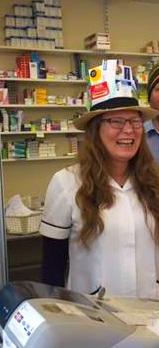



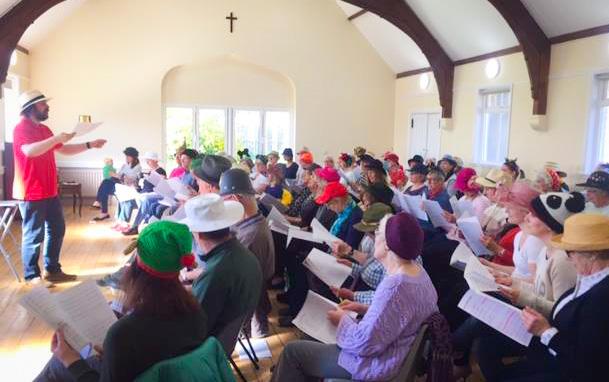



29MARCH THURSDAY 2018 TH
10 Autumn 2017 www.braintumourresearch.org
© Hexham Courant
DAY 2017
HATS
WEAR A HAT
–
OFF TO YOU!






HATTASTIC CLASSROOM ANTICS…


Wear A Hat Day is a fantastic fundraising event for staff and students alike – here is a snapshot of the fun!




Bournemouth School for Girls
Bielefeld School, a Service Children’s Education School based with the British Forces in Germany, held an event as part of their ‘Arts Week’ activities. They also held a hatty bake-off, colourful fashion show and fully-operational hat selfie photobooth. They raised an incredible €H3,500. Event organiser, Claire Pond-Barrett was motivated to support BrainTumourResearch following the death of her close friend, Steve Holbrook, who passed away from a brain tumour in 2016.




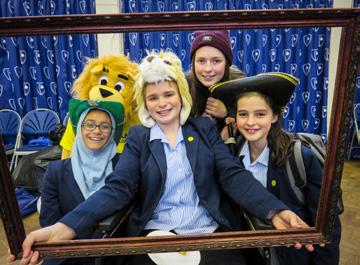
Bournemouth School for Girls held their Wear A Hat Day celebrations in collaboration with the Lions Club of Bournemouth, organised by Chair Pam White. The staff and pupils were encouraged to donate for wearing a hat, enjoyed having their own photobooth and bought and sold cakes and hat pin badges. The Lions’ motto is “Weareordinarypeople doingamazingthings.”– we agree!
Milton Keynes Academy Lucy Warn, Assistant Head of Year 10, has supported Wear A Hat Day for the last few years by arranging for groups of students to help make up and fill pin badge and pen boxes. This is always a great help to all at Hat HQ, enabling us to fulfil merchandise orders as quickly as possible – and the volunteering activity counted towards the students’ Duke of Edinburgh Award!
HOBBYCRAFT GET HATTY


DEBBIE McGEE



We were extremely grateful to have Hobbycraft’s dedicated nationwide support for Wear A Hat Day for the first time. The staff at the popular arts and crafts store not only wore hats across the Wear A Hat Day weekend but also held hat-crafting workshops and sold exclusively-designed pink top hats to Hobbycraftcustomers thanks to one of the store’s suppliers, Deepa Jivan, who lost her father to a brain tumour. Furthermore, they collaborated with couture milliner and friend of BrainTumour Research, Stephen Jones OBE, to create three ornate hats from materials bought in-store. They raised a craftastic £12,279!
As part of her continued commitment to BrainTumour Research, we worked closely with Debbie McGee to produce a unique ‘Rabbit in a Hat’ pin badge in memory of her beloved husband, world-renowned magician, Paul Daniels. The badge continues to be extremely popular and has raised over £9,000 to date!




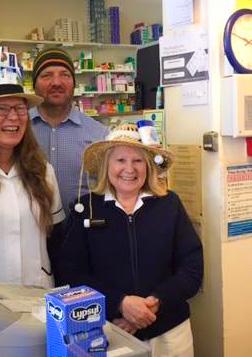


We can’t wait to see what Hobbycraft stores get up to for Wear A Hat Day 2018




CELEBRITIES GOING UNDERGROUND!





This year we were extremely proud to feature the faces of many of our famous supporters in a London Underground and National Rail poster campaign. Sheila Hancock CBE, Ed Balls, Sarah Beeny, Dr Dawn Harper and Linda Robson could all be spotted smiling from beneath our iconic pink topper! Keep an eye out during early 2018 for our next, exciting poster campaign...









Registering to take part has never been easier thanks to our fantastic new website. Sign up today and start planning your fundraising event. Fundraising packs will be distributed in early 2018 but our website has lots of ideas to inspire your Wear A Hat Day plans!



Buy yours today: www.braintumourresearch.org/merchandise www.braintumourresearch.org Autumn 2017 11
Our fundraisers are our heroes. We are constantly humbled and grateful to those who raise money by pushing their limits and stepping outside their comfort zone. Featured over the next four pages is a glimpse of the incredible physical challenges people have taken on recently for Brain Tumour Research!
fund a research centre to put an end to brain tumours JOIN IN, DONATE, help us fund the fight. Together we will find a cure
FUNDRAISING IN MEMORY OF UNCLE ALEX

Alex Lewis passed away in April 2013 from an aggressive grade 4 brain tumour, despite having been successfully treated for a grade 2 glioma, five years previously. Since Alex’s death, his family has raised in excess of £6,000 for various cancer charities in his memory, including Brain TumourResearch
In March 2016, Alex’s niece, seven-and-a-half year old Isabel took on a fundraising challenge of cycling 10 miles. Despite her own recent ill health, she was determined to complete the challenge;
spurred on by her sisters Esmee and Rosie and mother (Alex’s sister), Kate. Isabel completed the ride in an impressive 1 hour 40 minutes and raised over £1,000 in memory of her Uncle Alex.
A year later, on Rosie’s second birthday, the whole family took part in Wear A Hat Day. They asked for donations instead of presents and raised an excellent £155.
Kate is a Therapeutic Radiographer by occupation and so is only too aware of the prognosis for brain tumour patients: “Ihaveagoodunderstanding
oftheavailabletreatmentsandresearch/clinical trialsongoing(orlackof)andIhavedelivered radiotherapytopatientswithbraintumours manytimes.However,Ineverimaginedwe wouldonedaybegoingthroughthiswithaclose familymemberandatsuchayoungage. We willcontinuetoraisefundsinthehopethatone daytheremaybeacureforthisviciousdisease.”
Our warmest thanks to all who continue to fundraise in Alex’s memory
12 Autumn 2017 www.braintumourresearch.org FIGHTING FORCE HEROES
A TREK FOR EMMA
It has been over two years since the tragic passing of Emma Welch. At just 14 years old, she had already raised more than £13,000 for BrainTumourResearchin a series of demanding physical challenges. She was inspired to fundraise after her church minister, Andrew Stammers, was diagnosed with an aggressive brain tumour. She achieved these incredible physical feats despite her own battles with scoliosis; it was as result of complications during back surgery that Emma passed away in June 2015.
Earlier this year, Emma’s father Tony paid tribute to his extraordinary daughter by completing a 560-mile pilgrimage along the Camino de Santiago in Spain. He was conscious to live as simply as possible; setting himself a modest budget to live off each day and only carrying a small rucksack for vital
items and of course, one of Emma’s beloved teddies, Petal, as Daisy Bear was too big to accompany him on this trip.
Tony recalled: “Thefinal150milesorsoI foundveryspiritual.Imetsomanyothers whohadsufferedbereavementandwe shareddeepconversationsaboutourgrief. Therewerealsospiritualleadersandpriests ontheCaminospecificallytheretohelp peoplewhohadbeenbereaved.Ilearned thatIneededtostopthinkingofEmmain thepastwhereallthepainisandthinkof Emmanowasaspiritualbeing.”
Our humblest thanks to Tony and all of Emma’s family and friends who continue to raise


100 MILES FOR DAD
In June this year, Malcolm Boyd ran the equivalent of a marathon a day for four days, with the penultimate day coinciding with the first anniversary of losing his father, Arthur.
A father to seven-year-old Juliet and four-year-old Noah, Malcolm was shocked to discover that there were such limited treatment options available to his father, none of which would give him more than a few extra months. Realising that the only way to make a difference was to help fund research into brain tumours, Malcolm decided to take on an extreme challenge.

On reaching the edge of Bath, Malcolm summoned the last of his reserves to run to the finish line at Bath Abbey. Speaking at the time, Malcolm recalled: “Yesterday(11thJune)marked thefirstanniversaryoflosingDad.Itwas,asyoucan imagine,verytough,bothphysicallyandmentally,butthe emotionalaspect,if anything,helpedwiththe significantphysicalchallenge ofthemilesonthetrail.
“Isetouttoraise£2,740, theamountneededto sponsoronedayofresearch inDad’smemory,butIhave beenoverwhelmedbythe incredibleresponseIhave received...Myfundraising totalisnowjustshyof raisingenoughtosponsor, notone,butsevendays ofresearch!Thankyouto eachandeveryoneofyou whohasdonatedand supportedmein thisjourney.”
 Arthur & Malcolm Boyd
Arthur & Malcolm Boyd
We are hugely grateful to Malcolm for supporting us by taking on this amazing and gruelling challenge and to the many individuals and businesses who have sponsored him
www.braintumourresearch.org
Autumn 2017 13
TERRIFIC TEAMWORK
VIRGIN LONDON MARATHON 2017
This year an awesome 71 people made up our biggest London Marathon team ever, taking part in what is arguably the world’s most iconic race. We are humbled by each and every participant; their stories, their courage and incredible physical and mental determination.
A breath-taking £230,886 was raised by these amazing fundraisers.
Here are just a few stories from the team (we wish we could feature them all!):
Matthew Stride was diagnosed with a grade 3 anaplastic astrocytoma in 2015 and given a life expectancy of just six years. In October 2016, he proposed to his girlfriend in Dubai and six months later he and a group of friends took on the London Marathon! Lauren McLean, Jade Troth, Jack and Sophie McEvoy and of course Matthew himself, made up the incredible ‘Matthew’s Army’. This awesome group of friends raised over
Kevin Bell ran in memory of his Dad who passed away in 1992, at the age of 52. He raised over £12,000 with the help of friends and colleagues.
Dan Burridge is a low-grade brain tumour patient and was our youngest ever marathon runner – turning 18 just a few days before the event. Dan raised nearly £7,500!
Sally Dunn and Lisa Birch took on the challenge as Sally’s beloved daughter Holly, was battling a brain tumour. Tragically, Holly passed away just a few weeks after the marathon. This inspirational duo raised over £4,200.
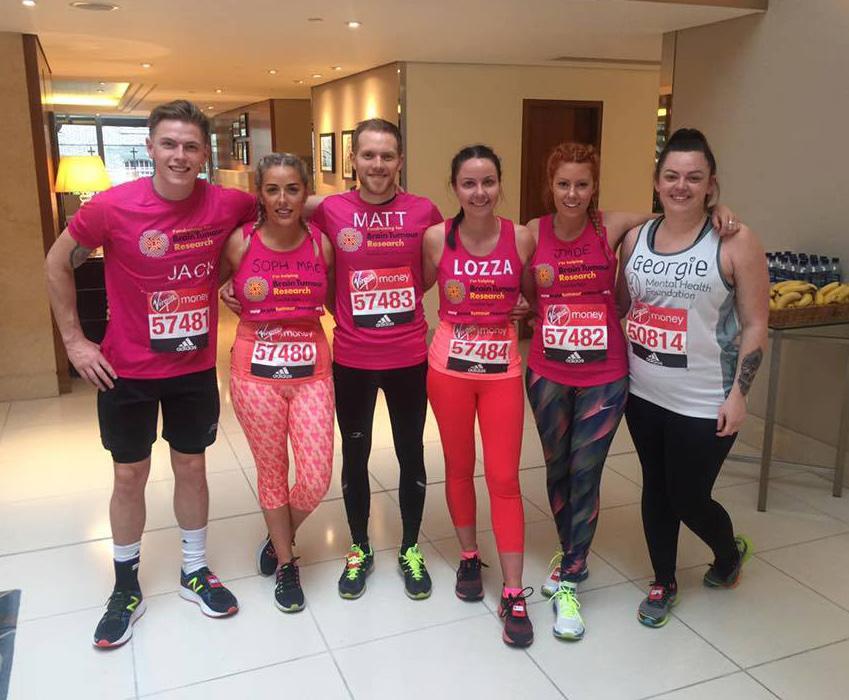
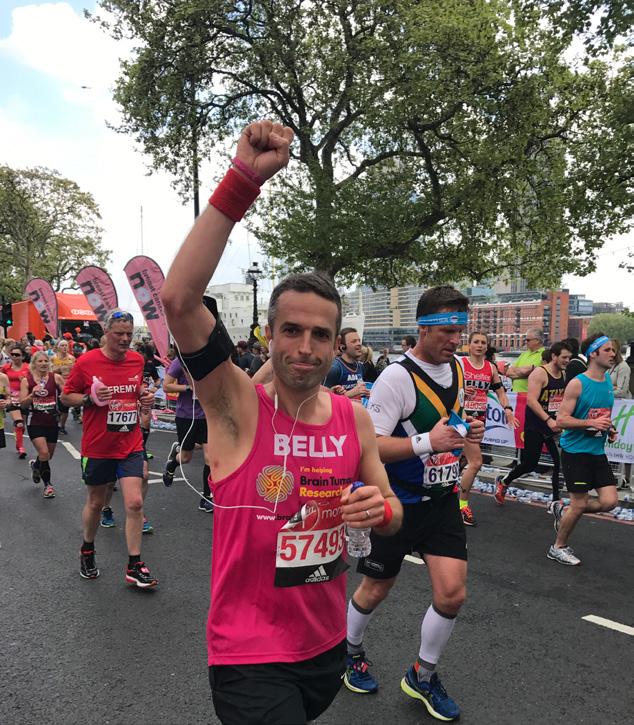
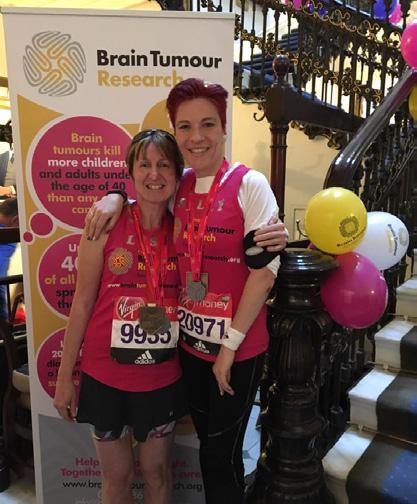
Sean Connolly’s friend Alan Mills lost his fight to a brain tumour last year. Sean has his own unique approach to fundraising; hosting a curry and quiz night and a ‘guess my time’ sweepstakes! He raised over a fantastic £6,200.


14 Autumn 2017 www.braintumourresearch.org FIGHTING FORCE HEROES
Kevin Bell
Sally and Lisa post-marathon
RUN FOR RESEARCH AND HELP FUND THE FIGHT
Sean Connolly
the national spend on cancer research has been allocated to this devastating disease
Matthew’s Army
Just 1% of
DanielBurridge




DARTMOOR DAREDEVILS
In June 2017, a team of six intrepid fundraisers took part in a daring abseil at the historic Meldon Viaduct in Devon.
The team were: Emily Badcock, Kate Coates, Mark Rundle, Lisa Evans and husband and wife, Matthew and Louise Jefferies (pictured here). These brave participants had been personally affected by brain tumours and so were hugely motivated to complete the challenge, even despite some having a fear of heights!
With no time for ‘hanging about’, these Fighting Force heroes raised almost £5,000 to help us get closer to a cure for this devastating disease.
www.braintumourresearch.org Autumn 2017 15


“ Taking on the Portsmouth Spinnaker Tower Abseil was awesome and very rewarding. I am grateful to everyone who sponsored me for this challenge, helping me to raise funds for vital research needed to find a cure for the disease that took my uncle.”
Jenny

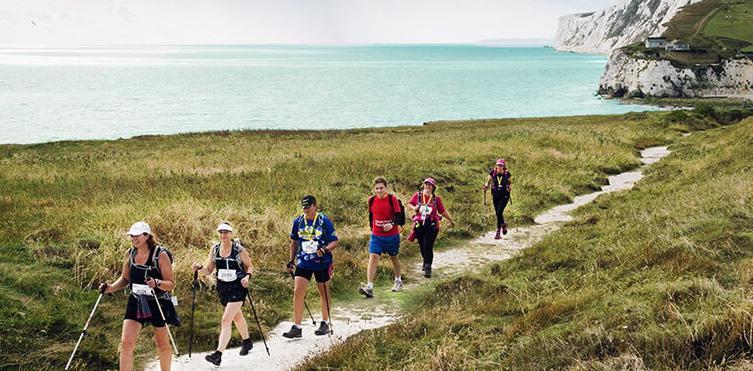




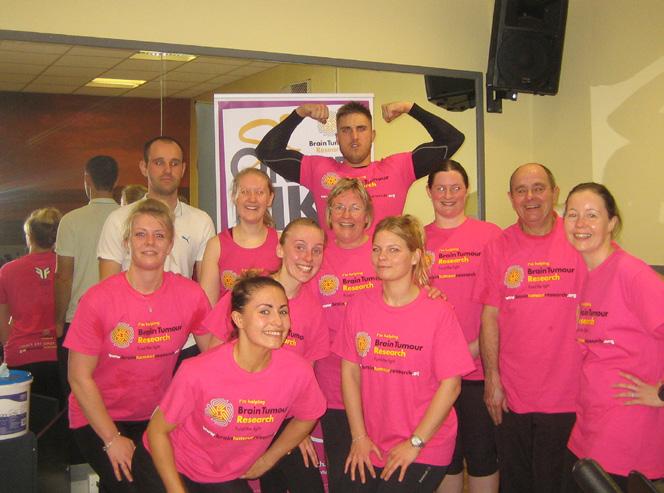


EVENT CALENDAR
16 Autumn 2017 www.braintumourresearch.org

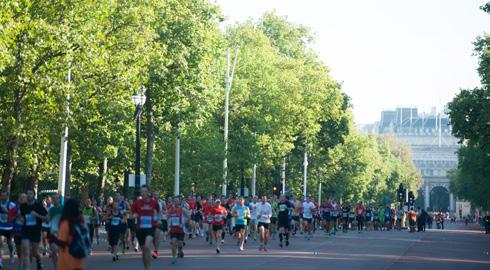

CHOOSE



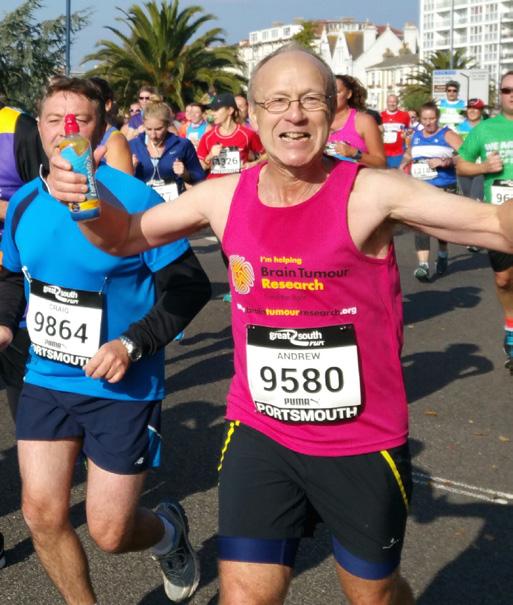


What will your next challenge be to help fund vital brain tumour research?
year, hundreds of supporters run, swim, cycle and trek to help us get closer to a cure for this devastating disease. Events range from 5k runs to marathon challenges – there really is something for everyone, regardless of fitness or skill level. Join our Fighting Force of activists today!
more information?
love to hear from you. Call us on 01908 867200 or email challenges@braintumourresearch.org More events to choose from here: www.braintumourresearch.org/take-on-a-challenge www.braintumourresearch.org Autumn 2017 17
Every
Want
We’d
YOUR CHALLENGE...
PlusNet Yorkshire Marathon
Parks Half Marathon Exeter’s Great West Run 15th October Simplyhealth Great South Run 22nd October Do it for Charity Santa Run 3rd December
On Yer Bike for Brain Tumours 3rd February The Big Half, London 4th March Vitality Bath Half Marathon 4th March London Landmarks Half Marathon 25th March Virgin Money London Marathon 22nd April Kiltwalk Glasgow TBC Isle of Wight Challenge 5th May Milton Keynes Half and Full Marathon 7th May Britain’s Ocean City Half Marathon, Plymouth 20th May Simplyhealth Great Manchester Run 20th May London to Brighton Challenge 26th May
2017
Royal
2018
BRITISH NEUROONCOLOGY SOCIETY ANNUAL CONFERENCE 2017
In June 2017, scientists at the forefront of research to find a cure for brain tumours gathered in Edinburgh for the annual conference of the British NeuroOncology Society (BNOS).

The event saw Professor Silvia Marino, who leads the Brain Tumour Research Centre of Excellence at Queen Mary University of London (QMUL), named as the society’s first female President. Silvia is Professor of Neuropathology at Barts and The London School of Medicine and Dentistry at QMUL and also Honorary Consultant Neuropathologist at Barts Health NHS Trust. Brain Tumour Research has supported her team of researchers, focusing on aggressive glioblastoma multiforme (GBM) brain tumours since 2014. As GBM are the most common and most lethal form of brain tumour, research in this area is vital.
The conference, which took place at the University of Edinburgh and was attended by representatives of BrainTumourResearch, marked the beginning of Professor Marino’s term of office after her nomination was unanimously supported by the BNOS council.
Silvia said: “TheBritishNeuro-OncologySociety existstopromoteresearchandeducationinall aspectsofneuro-oncology,aimingtoimprove treatmentandmanagementofpatients. Iamproudtorepresentthededicatedand highly-skilledmembersofthismultidisciplinaryorganisation.”
We are building a network of experts in SUSTAINABLE BRAIN TUMOUR RESEARCH


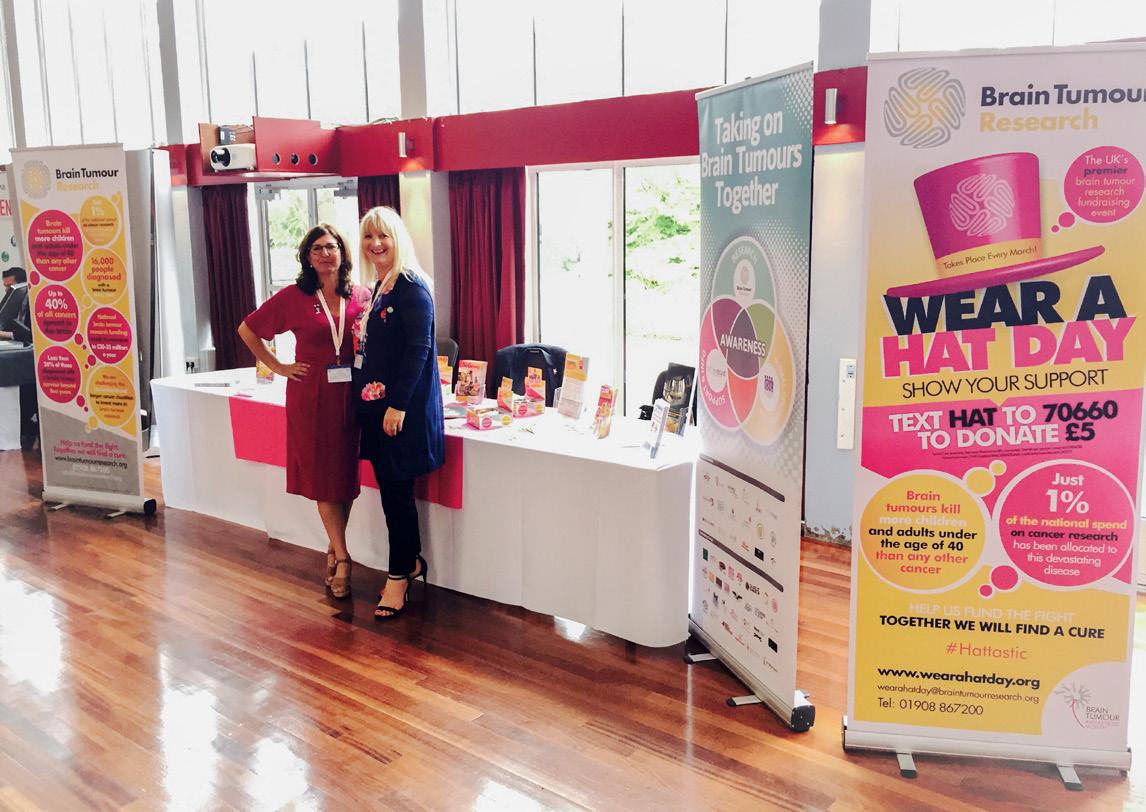

18 Autumn 2017 www.braintumourresearch.org RESEARCH UPDATES
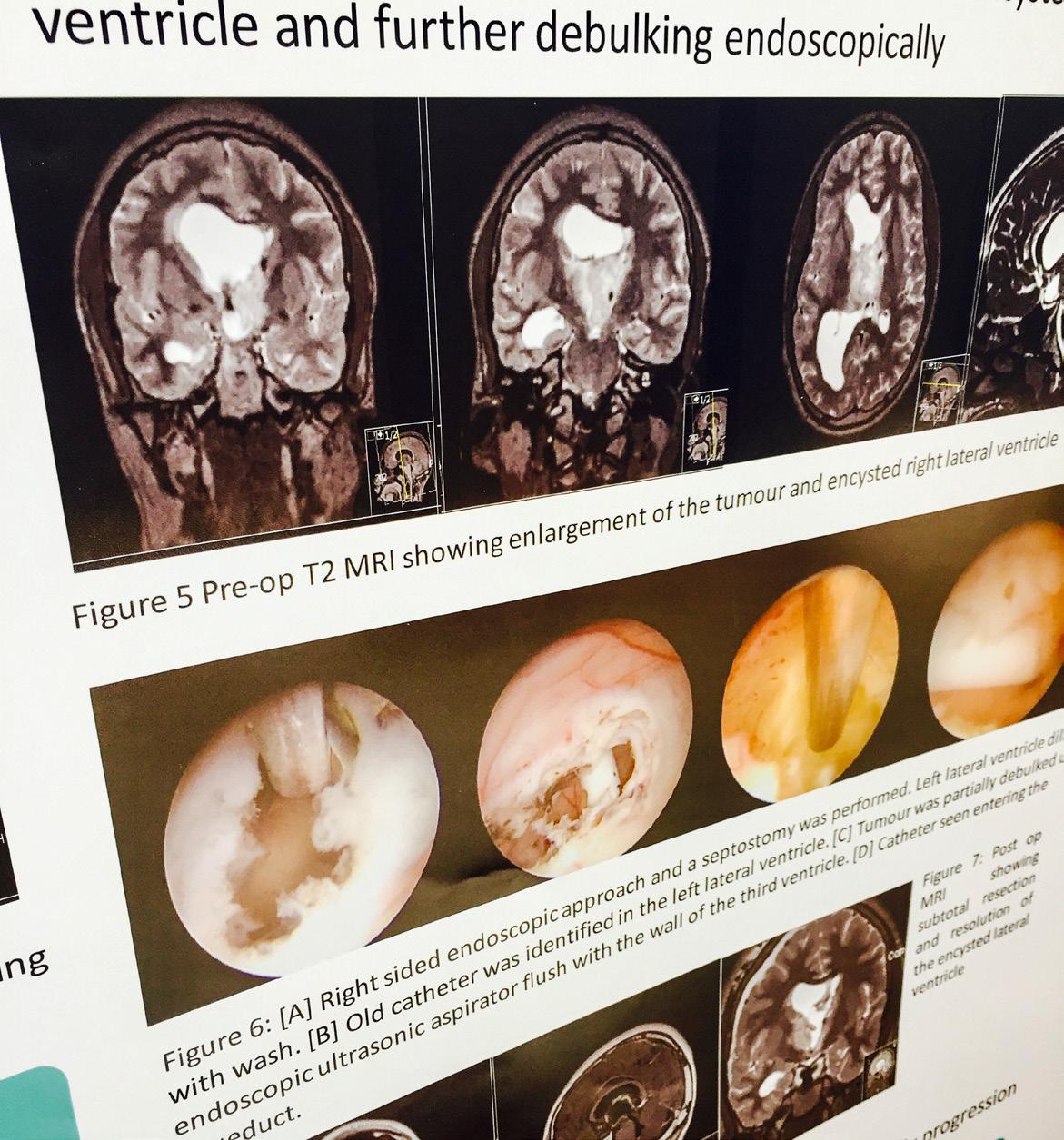



In keeping with our funding strategy which sees us investing in long-term research, building the “critical mass” of expertise needed to ensure sustainable and continuous research can take place, BrainTumourResearchwas delighted to recognise the talents of Dr Harry Bulstrode who was named Young Investigator of the Year.
The £2,000 award, presented jointly by Brain Tumour Research and BNOS, will help neurosurgeon Dr Bulstrode, 34, progress his work to find a cure for brain tumours. An Academic Clinical Lecturer at the University of Cambridge, Dr Bulstrode combines clinical training at Addenbrookes Hospital with research interests in the biology, and technologies for improving surgical techniques for the removal of brain tumours.
Dr Bulstrode, who received his award from Brain TumourResearch’s Director of Research Dr Kieran Breen, said: “Despiteallthatwehaveachieved inneurosurgery,braintumoursareoneofthe areasleastsatisfactorilyaddressedbysurgery.


Evenwiththebestpossibleoperationpatients withhighgradetumoursmayfindtheirlife expectancyisimprovedbyjustmonths,orafew yearsatthemost.
“Thisawardwillenablemetotravelto internationalconferencesandpresentmywork whichislookingathowvirustherapiescanbe usedtotreatGBMbraintumours.Thisincludes thepossibilitythattheZikaviruscouldholdthe keytofindingacureforthisdevastatingdisease as,unlikeothertreatments,itcanpassthrough theblood-brainbarrierwhichactsasafilterto protectthebrain.”
Dr Breen said: “TheworkbeingconductedbyMr Bulstrodeandhisteamisextremelyexcitingand hasalreadyattractedinterestfromaroundthe world.Weareproudtobeabletosupporthim withtheYoungInvestigatorAward.”
The award gave Dr Bulstrode the opportunity to present his work at the conference which was attended by delegates from across the UK, Italy,
India, Israel, Singapore, Hong Kong and Taiwan.
Also presenting was Dr Matt Williams, Consultant Clinical Oncologist at Imperial College, who led the BrainTumourResearch-funded ketogenic diet incubator meeting in 2016. He outlined the challenges of setting up two parallel phase 2/3 clinical trials to test the efficacy of the ketogenic diet on brain tumour patients.
BrainTumourResearchChief Executive Sue Farrington Smith, said: “BNOSbringstogether leadingneuroscientistsfromacrosstheworld. Theconferenceisagreatplaceforustoinform peopleacrossthebraintumourcommunity aboutourworkandalsoforustolearnwhat otherexpertsinthefieldaredoing.
“Onceagainwhatcameacrosswasthe dedicationandpassionthatallofthesepeople shareinimprovingoutcomesforpatientsaswe worktogethertofindacure.”
www.braintumourresearch.org Autumn 2017 19
DRUG REPURPOSING
– a novel approach for the treatment of brain tumours

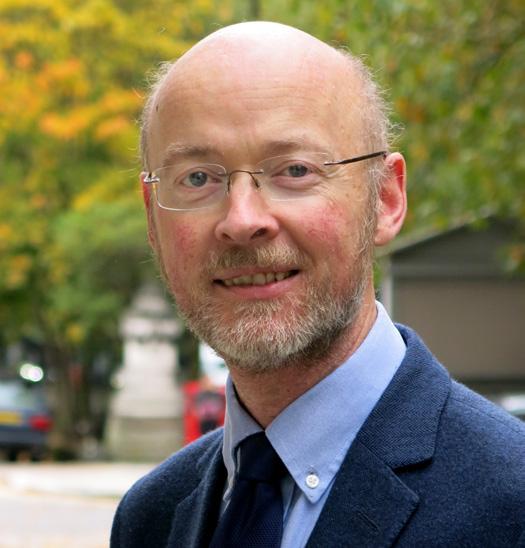
New and effective therapies are desperately needed for the treatment of brain tumours. However, the full development of a new drug can cost up to c.£1billion. Although a number of different therapies have been tested in clinical trials over the last few years, the results have been largely disappointing. There have been no front line therapies available to treat brain tumours since Temozolomide was approved for use by NICE in the UK in 2006. While there are new drugs in the early stages of development, it may be years before these will become available for people with brain tumours, and only if they can be demonstrated to be more effective than the existing therapies. But people with brain tumours need better treatments now. Therefore, we need to consider other initiatives for the identification of new therapies which will be effective for the treatment of brain tumours.
One promising approach is to assess the potential anti-tumour properties of existing drugs which are already being prescribed for the treatment of other conditions. This is called drug repurposing. As the drugs will have been tested for safety and are already in use in the clinic for these other conditions, the process to get them to brain tumour patients should be much faster than for new therapies. They could be used either alone or in combination with existing drugs or treatments (such as radiotherapy) to make them more effective.

20 Autumn 2017 www.braintumourresearch.org RESEARCH UPDATES
A special report from our Director of Research, Dr Kieran Breen
Such drugs can be identified using a number of complementary approaches. Assessment of clinical data from large-scale population studies may reveal an unintended additional benefit of a drug and studies of patient clinical records have suggested that certain anti-depressant drugs may be associated with a reduced incidence of glioblastoma. These findings support research from our Centre of Excellence within the University of Portsmouth, our team there have studied the potential of anti-depressant drug clomipramine to kill brain tumour cells when they are grown in a petri dish in the lab. However, this drug can have unwanted side effects. The biochemical factors within the cell which mediate this effect have been identified and additional work is now being carried out to identify which other drugs may act in the same way and also have anti-tumour properties. Ultimately, we hope to be able to test these in clinical trials.
A key challenge for drug repurposing is the blood-brain barrier. While this exists to protect the brain from harmful substances, it also prevents the entry of many drugs from the bloodstream into the brain. So, the repurposing of drugs which are known to enter the brain, such as antidepressants,
provides an attractive possibility for the treatment of brain tumours. Another approach is to reformulate the drug to put it into a form that will enter into the brain. A number of different approaches are being tested to increase the penetration of drugs across the blood-brain barrier.
Dietary changes provide another approach for the development of new therapies. Our Centre at Imperial College is carrying out research based on the fact that brain tumour cells have a high requirement for energy in order to grow and this is primarily obtained from glucose. Other sources of energy may be less efficient and therefore decrease their growth rate and the overall tumour development. The ketogenic diet is a high-protein, low-carbohydrate diet that has been used in the clinic for the treatment of paediatric epilepsy. Researchers have reported that it may prevent the growth of tumour cells in the lab. It may also make the cells more sensitive to existing treatments including radiotherapy and chemotherapy. Based on this, the group at Imperial plan to gain a better understanding of how this may work using tumour cells grown in the lab as well as planning a small clinical trial which may start in 2018.
But one of the key challenges associated with the development of clinical trials for drug repurposing or the development of dietary strategies is financial. Most of the drugs that are likely to be tested are classed as “off-licence” i.e. the companies which initially developed them no longer have market exclusivity and they are now prescribed in a generic form. Therefore, there is a lack of incentive for any pharmaceutical companies to invest in new clinical trials. Furthermore, drug repurposing is often led by academic units and medical research charities with minimal industrial involvement. So, charities such as BrainTumourResearchare often required to fill the gap to fund initial clinical trials.
Drug repurposing is one of the key topics we campaign on as requiring additional investment and support and we are passionate about bringing this forward. We are members of a working group which is currently preparing a report setting out the routes that can be followed to achieve repurposing. This will be key for us to be able to bring the promising drugs into clinical trials, identifying those that can ultimately be made available to patients.
Sponsor days of research at our UK Centres of Excellence


www.braintumourresearch.org Autumn 2017 21
THE DEVELOPMENT OF RESEARCH CENTRES OF
One of the key challenges for accelerating
brain tumour research in the UK is the lack of opportunities for junior neuro-oncologists to progress their careers. Initial grants may provide some initial research project funding, but due to the chronic lack of funding over the decades, research into brain tumours is woefully behind progress being made in other more high profile cancers such as breast and leukaemia. Thus the research needs sustained levels of continuous funding to really progress. Because of the shortage of further opportunities, neurooncology has suffered a ‘brain-drain’ – promising researchers choosing
to progress their careers in other countries or disease areas where greater opportunities and research funding exists...

...This is where we come in with our game-changing sustainable Research Centres of Excellence strategy. We are providing a unique, collaborative infrastructure within which promising young researchers have real opportunities to develop the specialist expertise and knowledge this sector so desperately needs. This will help them to realise their full potential including the possibility to obtain personal research fellowships and ultimately a University post which will allow them to build their own research group focused on brain tumours.
We are building research capacity through our Centres, growing the numbers of new brain tumour scientists and thus slowly but surely
accelerating the progress of ground-breaking research in the UK. As our Centres grow in reputation and stature, they will attract further funding from other key funding bodies such as larger cancer charities, corporate partners and trusts and foundations, all helping to secure our model of sustainable and continuous research that is the only way we will achieve our vision of finding a cure for brain tumours. The establishment of the Centres also stimulates the interaction between basic scientists and clinicians which is vital for the translation of lab-based discoveries into new cutting-edge treatments.
Our Centres work closely to form a powerful network, collaborating locally, nationally and internationally and together will bring the UK to the forefront of brain tumour research offering greater hope for those newly diagnosed or living with a brain tumour. We organise an annual research workshop where researchers and clinicians from our Centre members come together to share latest research insights and
developments,and develop ideas for collaboration utilising their complementary areas of expertise.
Our Centre at the University of Portsmouth, led by Prof Geoff Pilkington, was established in 2010 and to date 13 PhD brain tumour research students have had training as a result of our funding. We currently support nine expert researchers there who are rapidly moving the field forward. The Centre has been at the forefront of our drug repurposing programme, having identified promising compounds such as liquid aspirin and clomipramine for the potential treatment of brain tumours. They have also carried out pivotal research to understand the changes that occur on the surface of tumour cells which will determine whether they will invade the surrounding nerve cells. And they have developed a 3D model of the blood-brain barrier which is enabling them to test a large number of drugs to determine whether they could get into the brain and reach the site of a tumour.
22 Autumn 2017 www.braintumourresearch.org
INCOME AND GRANTS
BRAIN TUMOUR EXCELLENCE



An understanding of how tumour cells develop is vital for the development of new therapies.
Our Centre at Queen Mary University of London, directed by Prof Silvia Marino in collaboration with researchers at University College London, is examining what causes normal brain cells to develop into tumour cells. This may help us to identify biochemical factors within the cell which may be targeted by specific types of drugs to prevent tumour development.
Our Plymouth University Centre, directed by Prof Oliver Hanemann, focuses on low-grade brain tumour research. They have identified a number of genes which play a key role in schwannoma and meningioma tumours and this information is being used to classify new drug targets.

Some of their research is being carried out in collaboration with Dr Nel Syed from our Imperial College Centre.
A number of different therapies can be used for the treatment of brain tumours and our Centre team at Imperial College, London is carrying out ground-breaking research into the development of new tools to improve the accuracy of surgery to remove tumours. Mr Kevin O’Neill has led in the testing of the innovative iKnife tool, developed by Prof Zoltan Takats at Imperial College, a ‘smart scalpel’ that can improve surgical accuracy in the moment by differentiating between tumour and normal brain tissue. The Centre is also involved in the development of clinical trials, some of which will be directly related to research carried out at our other Centres.
The charity, in partnership with brainstrustand Charlie’sChallenge, also funds the BRAINUK initiative which links 26 Neuropathology Centres throughout the UK in a national database held at Southampton. This library provides details of over 400,000 tumour tissue samples and it provides a single point of application for researchers to obtain the tissue to carry out vital research.
Our Centres are carrying out a wide spectrum of research, from the basic genetics using samples from the BRAINUKtissue bank, right up to the development of new therapies and clinical research. By maintaining a focus on the ultimate translation of our basic research into the clinic, will get us closer to our goal of finding a cure for brain tumours.
www.braintumourresearch.org Autumn 2017 23
LEAVING A GIFT IN YOUR WILL TO BRAIN TUMOUR RESEARCH
Leaving a legacy in your Will for Brain Tumour Research is a remarkable gift. You will leave a lasting legacy of hope for thousands of brain tumour patients and their families and support vital scientific research into finding a cure for this devastating disease.


We know that writing a Will can be an expensive and time-consuming activity, so we have joined forces with the NationalFreeWillsNetworkto make the process as easy as possible for you.
As a member of the NationalFreeWillsNetwork, we are able to offer to pay for a limited number of simple Wills to be written at a discounted rate through participating solicitors. Whilst there is no obligation to include a gift to Brain TumourResearch, we sincerely hope that you will be able to do so in order to support long-term research at our UK Centres of Excellence.
Please contact us if you would like to benefit from this limited offer – email legacy@braintumourresearch.org or call us on 01908 867200.
John McMahon was looking forward to a long and happy retirement with his wife Judith. Previously fit and well, he began experiencing seizures and was later diagnosed with a low-grade glioblastoma brain tumour. Within months, the tumour had changed to an aggressive grade IV and he underwent radiotherapy and chemotherapy. He defied expectations and lived for three-and-a-half years, losing his battle in June 2014.
Judith re-wrote her Will to include a legacy to BrainTumourResearch. In her own words: “Researchintobraintumoursis soimportantbecauseitwillgivepeople hope,itwillgivethembetterprognosis andhopefully,eventually,givethema cure.Ifyoucangivepeoplehope,for
examplewithnewdrugs,itwouldbe absolutelywonderful.Itisshockingto findoutthatsolittlemoneyisspenton thisareaofresearchandyetitaffectsso manypeople.
“Leavingalegacyhasmademefeelthat outofsomethinghorriblelikeJohndying, Icannowhelpotherpeoplewhohave beendiagnosedwithbraintumours.”
Brain Tumour Research is also part of Remember A Charity – a consortium of over 140 charities set up to raise awareness of the importance of having a Will and leaving gifts to charities. You can also visit their website for further information about making a Will and leaving a legacy
www.rememberacharity.org.uk
LEAVE A LEGACY
www.braintumourresearch.org
Judith McMahon, pledger and fundraiser


www.braintumourresearch.org Autumn 2017 25 www.braintumourresearch.org/legacy legacy@braintumourresearch.org 01908 867200 Remember Brain Tumour Research in your Will and your gift will leave a legacy of hope. NATIONAL FREE WILLS NETWORK Just 1% of the national spend on cancer research has been allocated to this devastating disease Brain tumours kill more children and adults under the age of 40 than any other cancer Please tell us where you saw this advert when responding
AMBITIOUS
Now that Parliament has returned, following the snap General Election, so have the All Party Parliamentary Groups including the APPG on Brain Tumours. Brain Tumour Research is proud to provide the Secretariat for this group. The APPG was established in 2005 by John Bercow MP and our Member Charity Ali’s Dream, and has delivered fantastic results over the last 12 years. This APPG has never been more crucial in securing the change we all want to see.
July saw the group hold its inaugural meeting in this new Parliament, where it elected a new Chair and Officers and set out plans for the year ahead. The key issues for the APPG to tackle for 2017-18 include: expanding brain tumour tissue collection; building research capacity across the UK and the development of new brain tumour drugs and treatments.
The most significant development this year will be the release of the Department of Health’s Task and Finish Working Group’s report on brain tumour research. Health ministers have already acknowledged how important the report’s recommendations will be in shaping
the future of brain tumour research in the UK. Whilst the Government prepares their response to this new report, the APPG will initiate it’s examination of the findings in order to influence implementation of recommendations.
While the inaugural meeting was by necessity a small and formal meeting, there will be plenty of opportunities for supporters and partners within the brain tumour community to get involved throughout the coming year – indeed we couldn’t do it without you! The next meeting will take place in November and we’ll keep you posted on the details once plans
CHANGING CHAIRS
This year has seen Rebecca Harris MP, Chair since 2014, stand down following promotion to Assistant Whip. We congratulate her and wish her all the best in her new role.
At the inaugural meeting, Rebecca reflected upon her time as Chair, sharing how she felt the group is a good example of what an APPG can achieve for patients, and that she was saddened to leave. Like many MPs, Rebecca was touched by the stories of her constituents, including Chris and Lisa Green, who founded TheDannyGreenFund having lost their 11-year-old son to a brain tumour. Yourstoriestrulyareoneofour mostpowerfulweaponsinfightingthis devastatingdisease.
As we say thank you to Rebecca, we welcome Derek Thomas MP as the new Chair of the APPG. Derek is the MP for St Ives and describes himself as a champion for West Cornwall and The Isles of Scilly. We know he’ll be an excellent champion for the brain tumour community too.
Following his election, Derek said: “Iam honouredtohavethesupportofthebraintumour communityandmycolleaguesinbeingelected chair.ItisessentialthattheUKleadsthewayin investinginresearchforbraintumours.Abrain tumourdiagnosisisasdevastatingtodayasit was20yearsago.Thisisunacceptableforallthe patientsandfamiliesinourcommunities.”

Derek has been one of our most passionate parliamentarians when it comes to Wear A Hat Day, the UK’s premier brain tumour research fundraising event. Last March, he questioned the Prime Minister on the need to increase funding for brain tumour research. Derek has also previously visited our Centre of Excellence at Plymouth University, witnessing for himself the amazing work being done by Professor Oliver Hanemann and his team.

26 Autumn 2017 www.braintumourresearch.org
CAMPAIGNING
Challenging the Government and larger cancer charities to invest more in brain tumour research
PLANS
NEW OFFICERS
We have also welcomed both new and old friends to serve as Officers. Their role is to support the Chair and ensure the group is effective.
The Rt Hon Alistair Carmichael MP represents Orkney and Shetland and he was voted in as an Officer for the first time. Alistair has been touched by the experiences of brain tumour patients and their families in his own community and will be as strong a defender for our whole community as he is for them.
We are also pleased that both Kevin Brennan MP and Alex Carlile, Lord Carlile of Berriew are continuing to support us. Kevin and Alex have served as Officers for several years and their commitment to our cause and community is greatly appreciated.

BRAIN TUMOUR PLEDGE
During the General Election, we launched our #BrainTumourPledge campaign and were overwhelmed to receive more than 200 pledges, including many candidates with personal connections to brain tumours.
Derek and all of the Officers are as ambitious as we are to increase the impact of the APPG over this Parliament and we are looking forward to working with them.
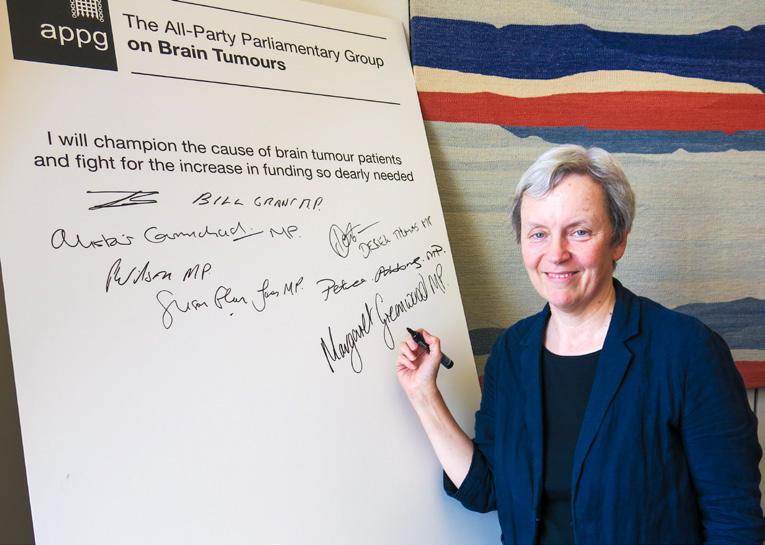
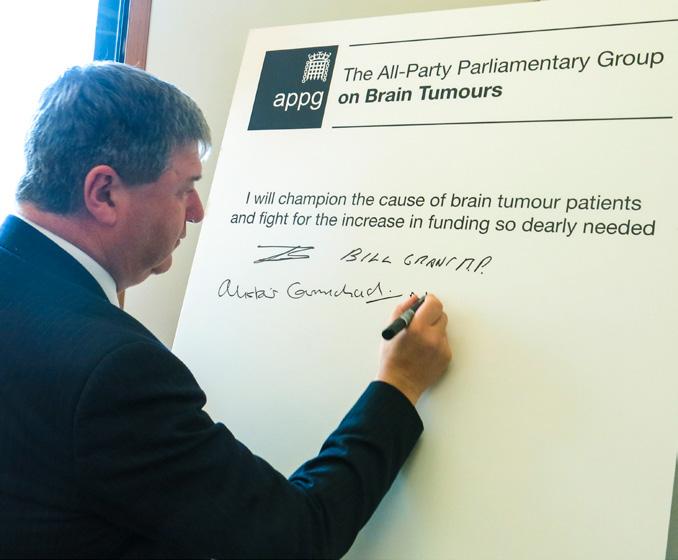

At the Inaugural APPG meeting, we hosted a dropin for MPs to sign our #BrainTumourPledge board. We were pleased that in addition to Rebecca Harris, Derek Thomas and Alistair Carmichael, there was a good turn-out at the meeting itself and 17 MPs happily signed, pledging to ‘champion the cause of brain tumour patients and fight for the increase in funding so dearly needed’.
These MPs included Tommy Brake MP, Patricia Gibson MP, Philip Hollobone MP, Steve McCabe MP, Tommy Sheppard MP, Jeff Smith MP and Wes Streeting MP.
We are also grateful to all who contributed to the APPG meeting, including Bill Grant MP, Margaret Greenwood MP, Marie Rimmer MP, Peter Aldous MP, Phil Wilson MP and Susan Elan Jones MP.


Campaign with us
www.braintumourresearch.org Autumn 2017 27
JOIN THE FIGHT FOR BRAIN TUMOUR RESEARCH FUNDING: HOW YOU CAN INFLUENCE PARLIAMENT
In their report the Petitions Committee summarised that “successive governments have failed brain tumour patients and their families for decades”. People power is the only way to make Government take notice of this devastating disease – too often the voice of brain tumour patients isn’t given equal airtime and platform as other diseases. This was amply demonstrated by one of our supporters, Maria Lester, who set up an e-petition in 2015 which received over 120,000 signatures. This led to a Petitions Committee inquiry, a Parliamentary debate and then a dedicated Government Task and Finish Working Group on brain tumours. Formed in October 2016, the Group will produce its report later this year. An amazing feat originating from just one devastated family.
In a democracy, true power lies with the electorate as MPs, MSPs, MLAs and AMs are there to take forward the concerns of their constituents. In the last year, BrainTumourResearchactivists have taken to their MPs the message about how chronically underfunded research into brain tumours is. This includes party leaders, cabinet members and backbenchers from across the political spectrum.
Parliamentarians who have actually met constituents with a brain tumour story are far more motivated to champion the cause of brain tumour patients. BrainTumour Researchcan then work with these politicians to influence policies on matters such as research funding and access to treatments.


If you’d like to help redress the historic underfunding of brain tumour research, then please register your interest in becoming a BrainTumourResearchactivist at: www.braintumourresearch.org/campaigning/campaign-with-us You can also email campaigning@braintumourresearch.org or call 01908 867200

Being an activist can involve anything from emailing your MP, meeting them at their surgery or local events, to attending meetings in Parliament. Any activities you undertake will be supported by our Campaigns Team and we’ll keep you posted on any specific issues that need a real push in the future. We’re here to help and support you to have your voice heard and to unite with others to push for improved outcomes for brain tumour patients and their families.
TOGETHER we will increase the national spend on brain tumour research to £35 million per annum and TOGETHER WE WILL FIND A CURE
28 Autumn 2017 www.braintumourresearch.org
CAMPAIGNING


Campaign with us
Meet Carrie, our new Head of Public Affairs
In May of this year we were pleased to welcome Carrie Hume to the Brain Tumour Research team, to take up the new role of Head of Public Affairs and Campaigning. Building on the amazing campaigning work that the charity has done to date, Carrie will continue to develop and implement the charity’s campaigning approach. Carrie comes from an environmental campaigning background, and has served as both Head of Policy and Director of Campaigns in the sector. Carrie will be well placed to manage the charity’s public affairs and campaigns team, and take the charity’s campaigns and Government engagement work forward to even greater successes.

Carrie is motivated by the injustice served on brain tumour patients and their families and having young children herself cannot imagine how anyone copes with the loss of a child to an illness as cruel as a brain tumour. “IdotheworkIdobecauseIwant tofutureproofmykidsandfuturegenerationsagainsttheimpactofdiseaseslike these.Thatweunderstandsolittleaboutbraintumoursandhowtocurethemin today’smodernageofmedicaladvancesisunbelievable,anditisunfairthatthe issuehasnothadmoreattentionandinvestment.Myjobistomakethisissue everypoliticiansissue,andtochannelourcampaigningandactiviststocreate thechangeweneedtoseeininvestmenttobringusclosertoacure.”
Task and Finish Group update
A Department of Health Task and Finish Working Group was established to find a better way forward on brain tumour research, as a result of the landmark debate in Westminster Hall in April 2016, and the petitions committee inquiry report earlier that year. Our Chief Executive, Sue Farrington Smith, has been meeting regularly with other cancer charities, leading brain tumour researchers and Government policy advisors through this Working Group to make specific recommendations to Government about the future of brain tumour research.
The Working Group’s report will be reviewed by Health Ministers before the end of this year, with an official response likely to come from the Government shortly afterwards. The report will cover a spectrum of issues relevant to our charity, but BrainTumourResearchis specifically influencing the thinking in a number of key areas. These include how to increase access to brain tissue samples, how to develop new brain tumour drugs, and what we need to do as a brain
tumour community to build research capacity in the UK through targeted investment and other institutional changes.
Brain tumour tissue can be difficult for researchers to access. As well as identifying suitable samples to study, other challenges include the legal and ethical questions surrounding the use of human tissue which can prove time consuming. We are looking to help speed up progress in this crucial area.
There are only two drugs available for the primary treatment of brain tumours, so new and more effective therapies are desperately needed. A small number of potential drugs are currently undergoing clinical trials. However, the overall developmental process is both slow and expensive and there has been a significant attrition rate with the majority of new drugs in the recent past failing to reach their primary endpoint in early stage clinical trials. Again we will be looking to highlight clearly where and how progress can be made.
Overall, one of the key gaps that has been identified is a lack of brain tumour research capacity within the UK. The UK should in theory be leading the game in Europe and beyond in brain tumour research, but has failed to attain this position. BrainTumourResearchhas made advances by establishing four Centres of Excellence and supporting the development of the next generation of researchers. Overall much more needs to be done to secure the underpinning funds and culture required for the UK to become leaders in this field.

For all the latest Campaigning updates visit our website: www.braintumourresearch.org/ campaigning and follow us on Facebook and Twitter @braintumourrsch.
You can also register to campaign with us via the link above.
Autumn 2017 29
www.braintumourresearch.org
WELCOME TO OUR NEW TRUSTEES.
Our trustees are valued and vital members of our organisation. This year we are proud to welcome four new trustees who join our board, bringing a collective new intelligence, influence, and focused expertise to help us reach new heights and usher in game-changing levels of funding for research. Learn more about each of our new trustees in their biographies here.
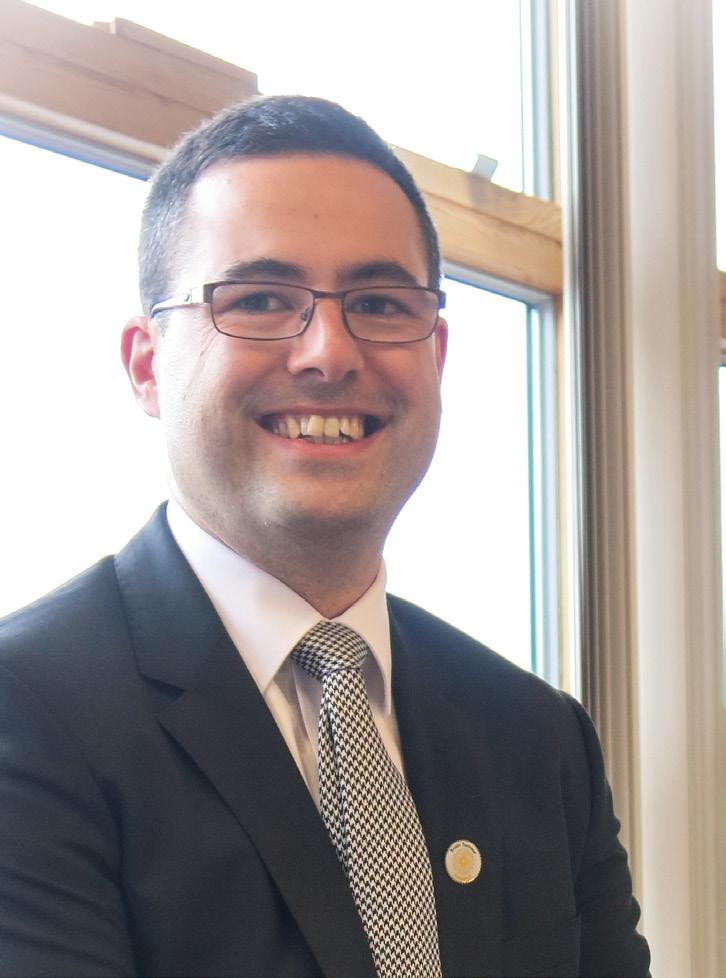
JEREMY ARON
GERARD KELLY
As a former Strategy and Public Affairs Advisor at the European Cockpit Association in Brussels, Gerard has considerable experience with strategy development, influencing, policy development, government relations, campaign delivery, and stakeholder relations.
In addition to experience in public affairs, Gerard is well-versed in public relations, where he led on the development and implementation of multinational media strategies aimed at maximising coverage and generating copy for internal member updates and external communications. He is a full member of the UK Chartered Institute of Public Relations (CIPR) and holds a masters degree in strategic management.
Gerard also completed a training course in collective negotiations in 2013. The training was delivered by Mr. Seth Rosen, who served on President Obama’s transition team responsible for reviewing the performance of the US National Mediation Board.
Jeremy is currently Legal Director of the Packaging division at DS Smith Plc, a FTSE 100 business. Jeremy is a highly experienced M&A and commercial lawyer. At DS Smith, he has helped to embed a culture of legal and regulatory compliance and implemented a robust system for managing legal and other risks within the Packaging division.
Prior to DS Smith, Jeremy managed the UK Legal Team at Siemens and before that he was EMEA Region Counsel for Baker Hughes, a Fortune 500 company. Jeremy is passionate about charitable causes and delighted to join the Board of Trustees of BrainTumourResearch

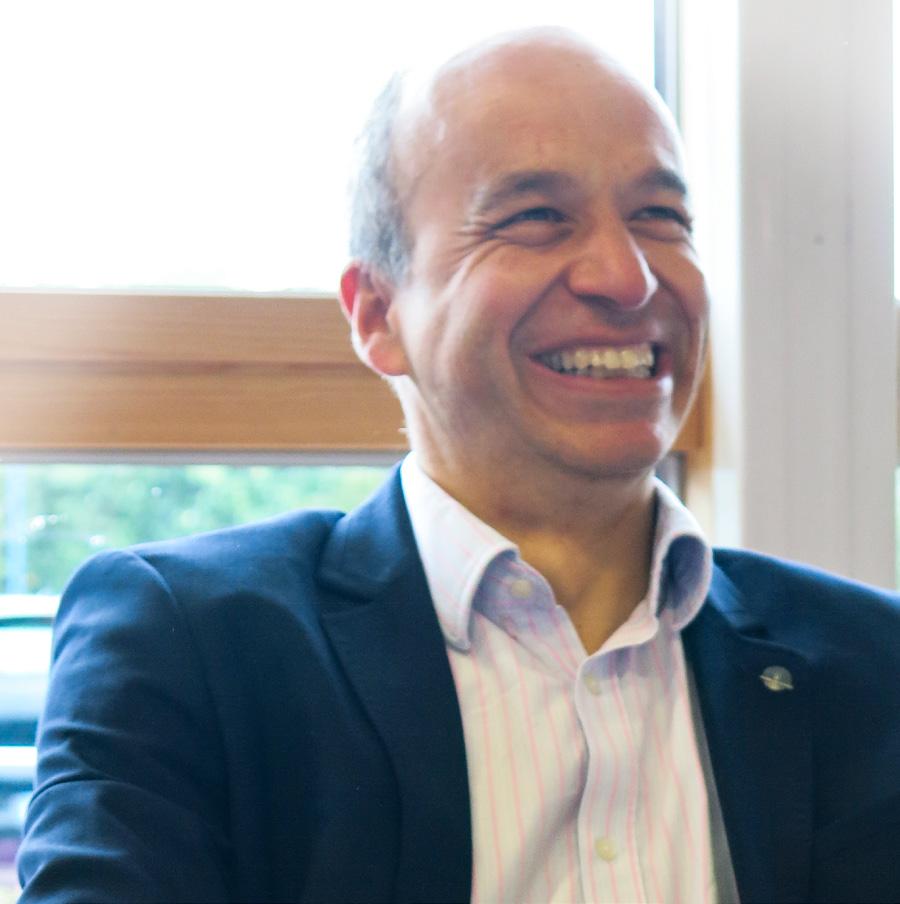
30 Autumn 2017 www.braintumourresearch.org
NEW TRUSTEES
JESSICA RANFT
Jessica is the Head of Global Field Marketing at Genpact, where she manages all field marketing activities across the US, Europe,
Australia and Japan, leading on integrated campaigns, account-based marketing and events.
Jessica prides herself on her ability to manage and communicate with complex stakeholder groups showing leadership, team development and functional planning. Prior to Genpact Jessica spent five years at O2, where she led Business Marketing and has previously held marketing roles at tech giant Fujitsu and was an Account Manager at Pell and Bales, developing telephone-based fundraising campaigns for some of the UK’s most prominent charities.
MARGARET STOCKHAM TURNER



Margaret has a clinical background as a chartered physiotherapist with 20 years board level experience in the healthcare sector in the UK, USA and Sweden. Margaret has previously led two NHS Trusts as Chief Executive, and held non-executive roles for the East of England Ambulance Services NHS Trust and a UK-based biotech company, Cliniweave. She is also an adviser to the biotech company Oxehealth.
In 2007 Margaret founded management consultants, Partners in Practice Ltd, providing advisory services to the Cabinet Office and national bodies. She has also previously held advisory roles for the Department of Health, European Parliament and the United Nations.
Margaret is Chair of the Bedfordshire, Luton and Milton Keynes Mind charity and is currently International General Secretary for the European Union of Women (EUW), as well as the British Section Chairman.
www.braintumourresearch.org Autumn 2017 31
Together we will find a cure


Annie’s Challenge was set up in 2015 to provide funds to help support those affected by brain cancer. It looks to do this in several ways: by offering financial assistance to research programmes looking at the disease; by helping those in the later stages of cancer with the care they need and by providing funds to other charities with similar objectives. Their current aim is to support the funding of a researcher at our Centre of Excellence at Queen Mary University of London.
Annie Hughes was a sister, daughter, wife and mother and in July 2015 was diagnosed with an astrocytoma brain tumour. Despite the news however, Annie remained positive and keen to raise funds for other people in her situation. Annie’sChallengewas born out of this desire.
Annie very sadly passed away at home on Monday 7th March 2016, aged just 29. The work of the charity continues as a tribute to her. Fundraising challenges already completed include an epic 6,500-mile walk from England to Kathmandu and conquering the Welsh Three Peaks!
We are extremely proud to welcome Annie’s Challengeto our family of member charities.
Find out more: www.annieschallenge.org

The Brain&SpineFoundationhas recently launched an updated publication on brain tumours. The booklet, which is accredited by the NHS Information Standard, provides information for patients and carers on brain tumours in adults and focuses on primary brain tumours. The publication addresses frequently asked questions on the topic, common symptoms, tests and investigations and possible treatments. It also provides information on rehabilitation and returning to everyday activities, as well as a list of useful contacts for further information and support.
The charity is grateful to everyone who contributed to the booklet, especially Dr Fiona McKevitt, Professor Geoff Pilkington, Orla McKee, Dr Paul Mulholland, Dr Nicholas Brown, Sue Farrington Smith MBE of Brain Tumour Research and Dr Helen Bulbeck of brainstrust.
Other Brain & Spine Foundation publications include information resources on neurological topics such as spinal tumours, angiogram procedures, brain and spine scans and craniotomy.
To read, download or order the Brain & Spine Foundation’s publications free of charge, please visit:
www.brainandspine.org.uk/our-publications
Brain Tumour Research is proud to have co-funded a research programme with Member Charity Thorne Mason Trust –a collaboration between the University of Portsmouth and Cardiff University.
Cancer Research Wales – supported by Thorne Mason Trust and Cardiff University – and Brain Tumour Research have granted £180k to fund two PhD students to assist in vital research into glioblastoma multiforme (GBM) brain tumours – the most malignant form of brain tumour.
Professor Mark Gumbleton at Cardiff University and Professor Geoff Pilkington at the University of Portsmouth are working together on a research project examining the role of a protein called caveolin with respect to the function of cancer stem cells and immune cells within brain tumours. The project is working towards developing more specific targeted therapies for future patients.
Professor Geoff Pilkington summarised: “Ihopethatthisresearchcollaboration willleadtoagreaterunderstandinginthe
areaofGBMs.Itisonlythroughinnovative researchprojectsthatwewillfindacure for brain tumours.”
Local MPs, Welsh Assembly Members, charity supporters and representatives, researchers from Cardiff University and the University of Portsmouth and journalists were invited to an event on Wednesday, 5th April at Cardiff University. At this event guests heard about the expanding capacity for brain tumour research. Scientists showcased their activities and explained how funding from Brain Tumour Research and its supporters is having an impact in this neglected field of cancer research.


32 Autumn 2017 www.braintumourresearch.org
MEMBER CHARITY UPDATES

BRAIN TUMOUR SYMPOSIUM
In October 2017, Brain Tumour Research and brainstrust will proudly present their joint UK Brain Tumour Symposium.
We’re bringing leading experts from many
areas
of
brain tumour research and support together for this inaugural event to show the progress that is being made on many fronts to improve outcomes for people living with a brain tumour.
Our aim is to discuss some of the biggest issues facing the UK brain tumour community today and review the specific advances that are being made.
Interest in this event has been huge and we reached maximum capacity within 48 hours after we first announced it in August. This is a tremendous endorsement of our belief that this is something that the brain tumour community wants and needs.
If you’re not on the guest list for this year then rest assured we intend to make this an annual event and you can submit your interest for next year’s Symposium today by completing the registration form on the website www.braintumoursymposium.org. If you have any questions about this event, you can email us on symposium@braintumourresearch.org
We will report on the outcomes of this year’s Symposium in our next issue of Believe, publishing in January 2018


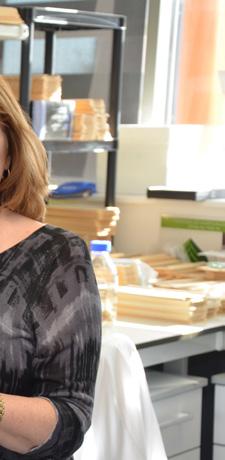
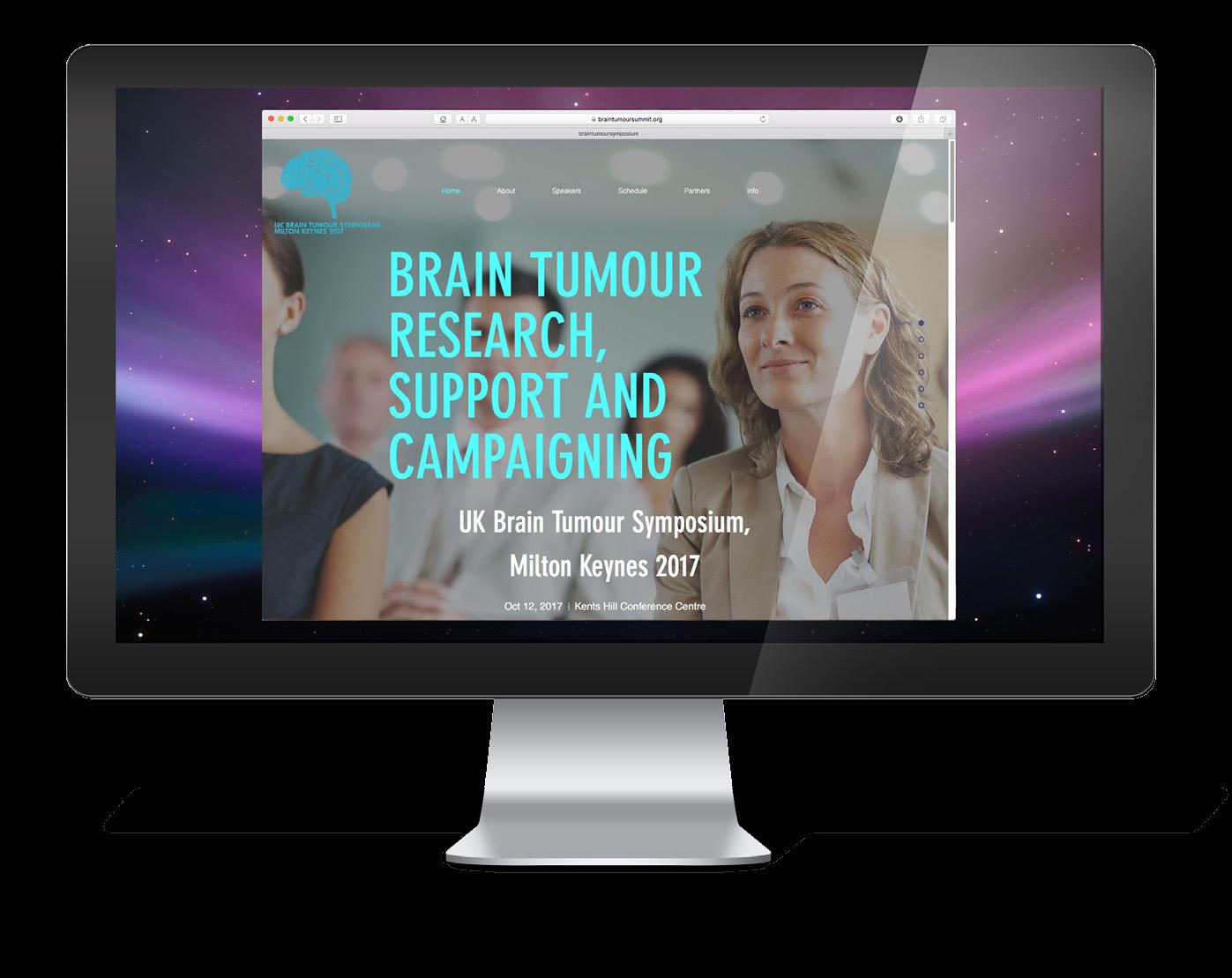
October 12th 2017
Autumn 2017 33 2017 SYMPOSIUM


CHRISTMAS 2017 HOPE TREE APPEAL...
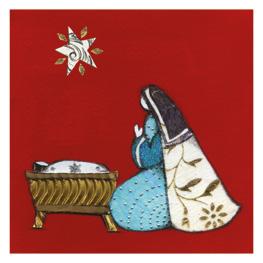
Cards only £4 per pack

Whilst Christmas is full of festivities and celebrations, we know that it can be a difficult time for our supporters.
Each year, the BrainTumourResearch Hope Trees take pride of place in the heart of our Centres of Excellence during the festive period. They display special baubles with messages from our supporters, and anyone who has been affected by brain tumours. We are always inspired and moved by the messages of love, determination, hope and inspiration we receive at this time of year and are proud to display them as a symbol of strength and resilience against this devastating disease.

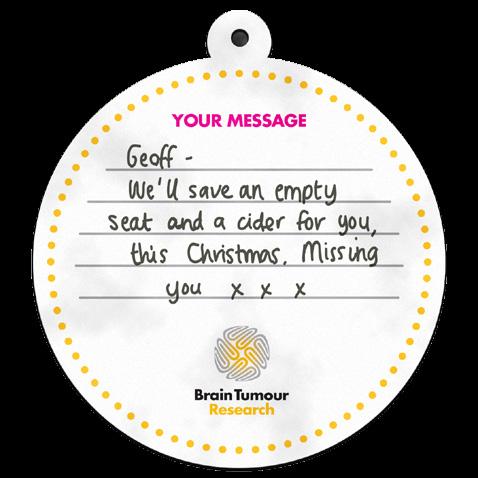
The Hope Tree Appeal acts as both a tribute to loved ones and a way of raising money to support the vital research at our Centres.
To donate and add your own, personalised bauble to one of our Hope Trees this Christmas, visit our website for more information www.braintumourresearch.org/hopetree or email supportercare@braintumourresearch.org
CHRISTMAS CARDS
Help us fund the fight whilst sending loved ones a festive message at the same time.





If you would like to help us get one step closer to a cure this festive season, you could buy or sell our lovely Christmas cards. We have a great range of cards for 2017 so there is sure to be something for every taste! This includes ‘Hope Tree’, a new bespoke design (pictured right) painted by supporter Caroline Copland, who lost her mother Janet to a brain tumour. The cards are £4 per pack and at least 60% of the proceeds go towards supporting vital brain tumour research in our Centres of Excellence. Our cards are also available to sell at your local Christmas fair, sports club, school or workplace. These can be sent to your home address – it couldn’t be easier! Just let us know how many packs of cards you require and then after Christmas, simply return any you don’t sell along with the money you raised.




Our cards are available to buy through our eBay shop www.braintumourresearch.org/merchandise or alternatively contact supportercare@braintumourresearch.org or give us a call on 01908 867200

34 Autumn 2017 www.braintumourresearch.org THE HOPE TREE


Joanne Adamson
Dawn Ball
Nigel Balsdon
David Charles Bell
Fiona Bingham
Arthur Henry Bolton
Marcus Braley
Vivienne Bramble
Margaret Brown
Beryl Buckley
Katharine Cameron
Kristian Paul Davies
Peter John Davis
William Doidge
Aurelia
Doniselli-Morgan
Andrew Dykes
Nic Ealey
George Eato
Brian Ian Foster
Shirley Foster
Natalie Freeman
Judith Garside
Edward Gibson
Debbie Gregory
Andrew Grey
Maggie Gumble
Katherine Hardwick
Brian William Harris
Wendy Jean Harris
Noel Harrison
Albert Harold Harvey
Michael John Harvey
John William Hatt
David George
Hawksworth
Philip Charles Hazell
Alexandra Lloyd Head
Janice Hearl
John Heath
John Henderson
Claire Hewett
Thomas Hill
Joy Hobbs
David John Holman
Lee Hopkinson
James Huish
Michelle Inman
forever in our hearts
From all of us at Brain Tumour Research, our love and thoughts are with all those who inspire us and with everyone who continues to support us in memory of their loved ones and colleagues, year after year.
David Johnson
Gary Jones
Sarah Jones
Peter Charles Kirk
Moira Kirkwood
Adam Lewandoski
Gary Lewis
Rosemary Lewis
Peter Lenton
Pamela Lupton
Michael Maine
Adam Marshall
Helen Maughan
Katie McGhee
Alan Morley
Linda Murray
Lee Francis Noble
Mita Rajesh Patel
Linda Ann Payne
Linda Paul
Mary Alice Phillips
John Richard Phipps
David Pomfret
Desmond
Stuart Prior
Alice Proffitt
Brian Elliot Richter
Julian Rooth
Diana Rose
Kathryn Rowbotham
Harry Desmond Rowley
Karen Lesley Sanderson
Jean Scott
Kenneth Smith
Jean Starnes
Ryan Taylor
Alex Tice
Graham
Ronald Thexton
Michael Tompkins
Victoria Waiting
Lyn Mary Webster
Niki Whyley
Elizabeth Moira Will
James Willetts
Leslie Williams
Pat Williams
Sylvia Williams
Kenneth Gill
Jeremy Goford
Dr Frederick
Hugh Jardine
Kennard Prideaux
Terry Wooster



www.braintumourresearch.org Autumn 2017 35
Loved ones here include those lost to a brain tumour for whom we received funeral donations between 1st April 2017 - 30th June 2017



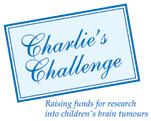


























Together we will find a cure Our Fundraising Groups Our Member Charities www.braintumourresearch.org | Tel: 01908 867200 info@braintumourresearch.org Brain Tumour Research, Suite 3, Shenley Pavilions, Chalkdell Drive, Shenley Wood, Milton Keynes, Bucks MK5 6LB Registered charity number 1153487 (England and Wales) SC046840 (Scotland). Company limited by guarantee number 08570737. We love hearing from you! Whether you’d like to set up a regular donation, discuss fundraising ideas, are interested in becoming a Fundraising Group or simply want some information... we are only a call, email, tweet or Facebook message away. DIVISION OF NEUROPATHOLOGY AND DEPARTMENT OF NEURODEGENERATIVE DISEASE Our Centre of Excellence Partners #FundingTheFight MARK “BOMBER” LANCASTER TRUST The Lorn’s Legacy song for sue IN PARTNERSHIP WITH BRAIN TUMOUR RESEARCH FOUNDATION THE Leah’s Fairy Fund







































































































































 Arthur & Malcolm Boyd
Arthur & Malcolm Boyd

























































































































